| Medically reviewed by
Robin Backlund, BHSc
Last update:
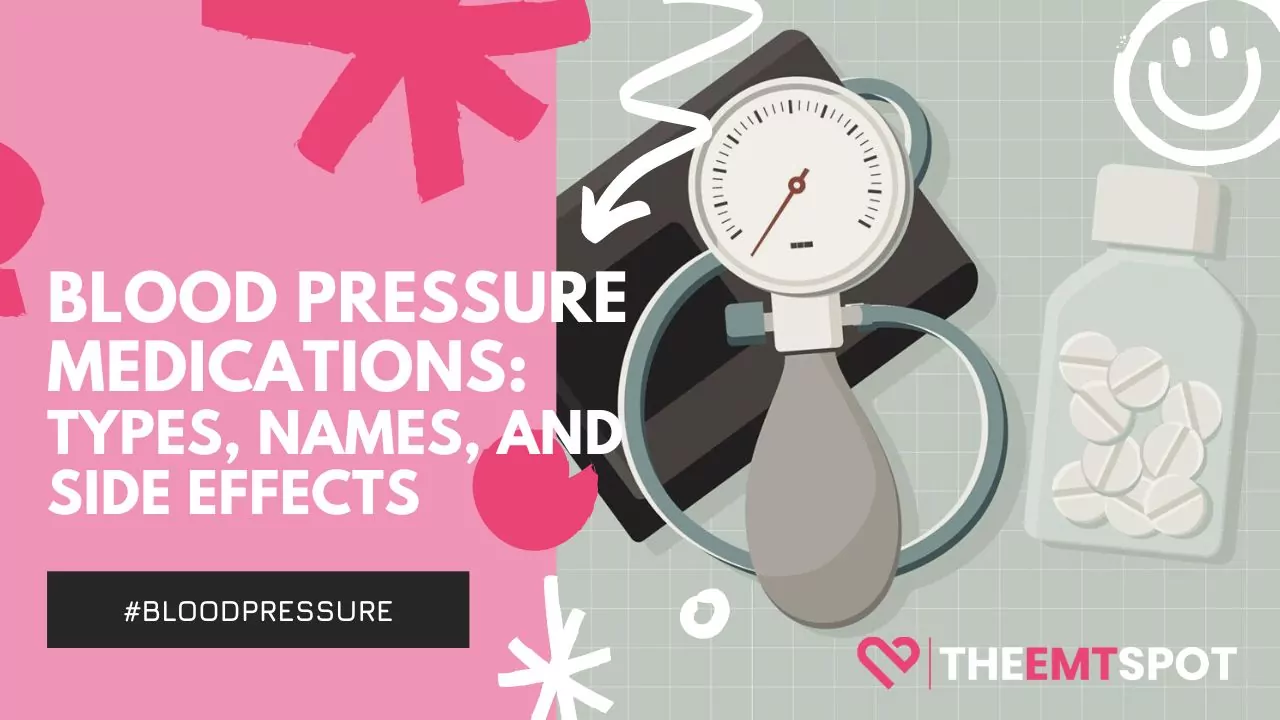
Blood pressure is one of the most critical measurements you can get in order to safeguard your heart health.
When circulating blood exerts pressure on the vessels carrying it, it is referred to as blood pressure.
When this pressure is either too high or too low, it becomes a cause for concern, especially in cardiology. Consequently, managing blood pressure is a crucial aspect of maintaining overall health.
Understanding blood pressure medications is vital as it empowers individuals to make well-informed choices regarding their health.
High or low blood pressure can be a silent threat, often presenting with no symptoms until significant damage is done.
Being informed about medications allows individuals to understand their treatment options, manage side effects, and work closely with their healthcare providers for optimal health outcomes.
Among the various types of medications for high blood pressure, ACE inhibitors have emerged as a popular and effective choice.
This medication class helps relax blood vessels by blocking the formation of signaling molecules that narrow blood vessels.
One of the most well-known high blood pressure medications is enalapril, popularly known under the brand name Vasotec.
Enalapril has gained popularity for its ability to effectively reduce high blood pressure and lower the risk of heart failure. Its generally well-tolerated nature results in a relatively low occurrence of severe side effects.
However, like all drugs, enalapril has side effects, and the most common, for instance, is a dry cough, which can be bothersome but is generally not harmful.
On the other hand, fludrocortisone is often recommended for treating low blood pressure. This medication helps increase blood volume, which in turn raises blood pressure.
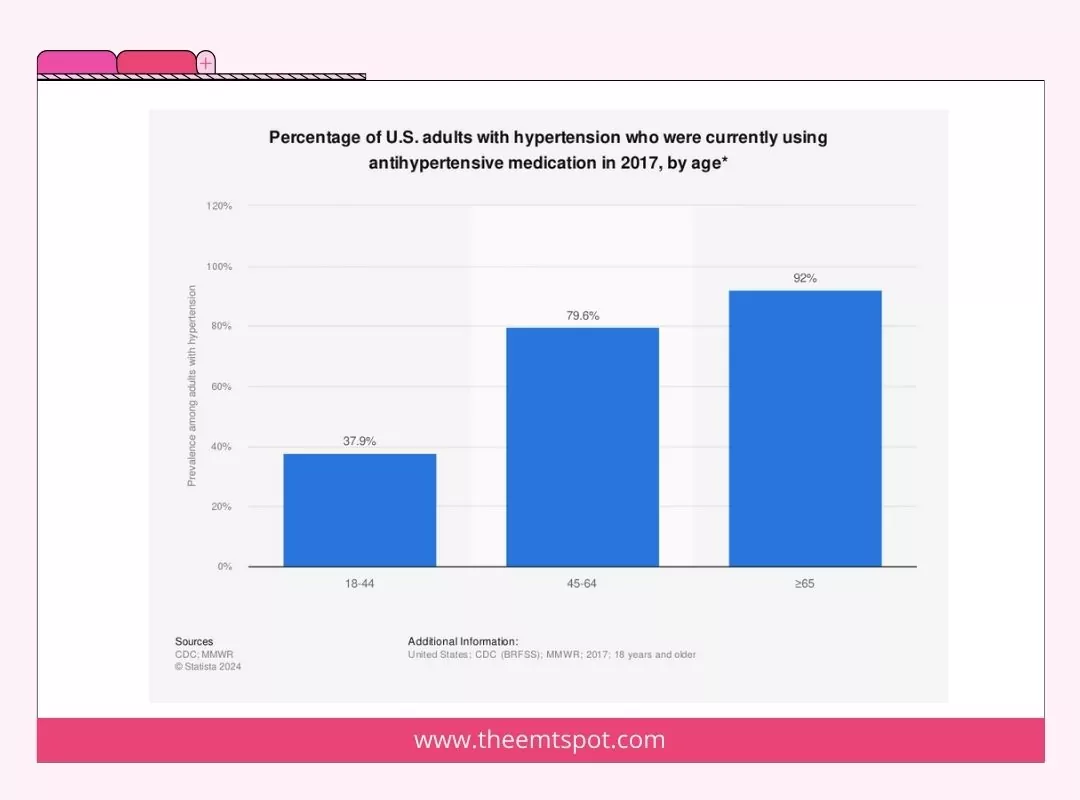
Constant monitoring is one of the most recommended heart care practices. The Oxiline Pressure X Pro and CheckMe BP2 are excellent choices for those monitoring their blood pressure at home.
These monitors are known for their accuracy and ease of use, enabling patients to keep track of their blood pressure effectively.
But during an emergency situation, lying down with feet elevated can help increase blood pressure quickly. However, this is temporary, and consulting your doctor is crucial for long-term management.
Despite all these, the most compelling reason to treat high blood pressure is its role in preventing life-threatening complications such as heart attack, stroke, and kidney disease.
By staying informed about blood pressure medications, you can actively engage in heart care, leading to better health outcomes and quality of life.
Contents
What are the types of blood pressure medications?
There are various types of blood pressure medications ranging from ones acting on the blood vessels to those drugs that regulate the heart cell function.
These medications help to lower blood pressure, reducing the risk of heart disease and stroke.
Understanding the types of blood pressure medications is crucial for those seeking to manage their condition effectively.
According to Mayo Clinic, a comprehensive list of all blood pressure medications is below.
- Angiotensin-converting enzyme (ACE) Inhibitors
- Diuretics
- Angiotensin II receptor blockers (ARBs)
- Alpha-blockers
- Alpha-beta-blockers
- Beta-blockers
- Calcium-Channel Blockers
- Central Agonists
- Vasodilators
Each type of medication works differently and may be prescribed based on the individual’s specific health needs and medical history.
1. Angiotensin-converting enzyme (ACE) Inhibitors
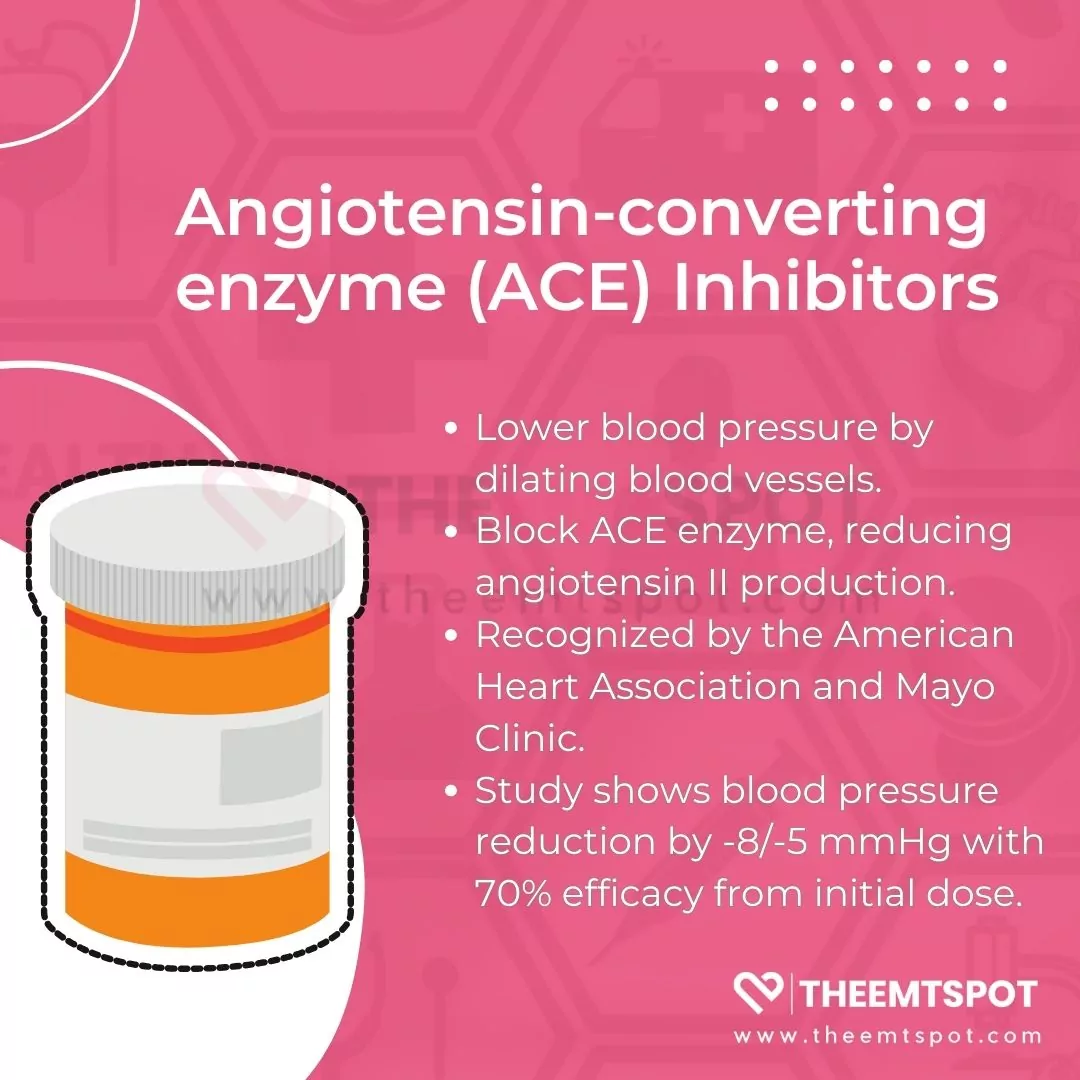
Angiotensin-converting enzyme (ACE) inhibitors are medications designed to lower blood pressure by dilating blood vessels.
These drugs achieve this by blocking the action of the enzyme ACE, which is responsible for converting angiotensin I into angiotensin II—a substance that narrows blood vessels.
The efficacy of ACE inhibitors is well-documented through numerous studies and endorsements from reputable health institutions.
The American Heart Association (AHA) and Mayo Clinic recognize them as crucial treatments for hypertension.
A study published in the Cochrane Database of Systematic Reviews by a team of researchers from the University of British Columbia suggests that ACE inhibitors indeed lower blood pressure by -8/-5 mmHg.
Unlike other medications, 70% of this reduction occurred with the initial dose, making it a good first-line drug for treating hypertension.
What are the benefits of ACE inhibitors?
ACE inhibitors offer a range of benefits, proving effective in the treatment of high blood pressure, heart failure, and kidney protection.
They are especially valuable for individuals with diabetes and have been linked to improved survival rates following heart attacks.
What are the most commonly used ACE inhibitors?
Common ACE inhibitor formulations include lisinopril, enalapril, ramipril, and captopril. However, more generic varieties are currently available in the market.
Who can take ACE inhibitors?
Typically, these drugs are appropriate for adults managing conditions like hypertension, heart failure, or kidney disease. They are frequently prescribed for individuals with diabetes and those who have experienced a heart attack.
Who shouldn’t take ACE inhibitors?
Avoid ACE inhibitors if you are pregnant, have a history of angioedema, severe kidney disease, or are undergoing other treatments. Consult a healthcare provider for guidance on their use.
Can pregnant women or children take ACE inhibitors?
Pregnant women should avoid ACE inhibitors due to potential harm to the fetus. While children may take them under medical supervision, such prescriptions are less common.
Additionally, individuals with a history of angioedema or severe kidney disease should steer clear of ACE inhibitors.
How should ACE inhibitors be taken?
ACE inhibitors are typically administered orally, usually once or twice daily, with the specific dosage dependent on the medication and individual health conditions.
Are ACE inhibitors used for anything besides treating high blood pressure?
Beyond their effectiveness in treating hypertension, these drugs also play a role in managing heart failure, safeguarding the kidneys in diabetes patients, and reducing the risk of stroke.
What are the potential side effects of ACE inhibitors?
It’s important to note that ACE inhibitors may come with certain side effects, including a persistent dry cough, increased potassium levels, dizziness, and headaches.
More serious but less common side effects may include kidney failure and angioedema.
What drugs and foods interfere with ACE inhibitors?
These drugs can interact with other medicines, such as NSAIDs, diuretics, and lithium.
Patients taking ACE inhibitors should be cautious with potassium supplements or potassium-rich diets, as these medications can lead to elevated potassium levels.
2. Diuretics (water pills)
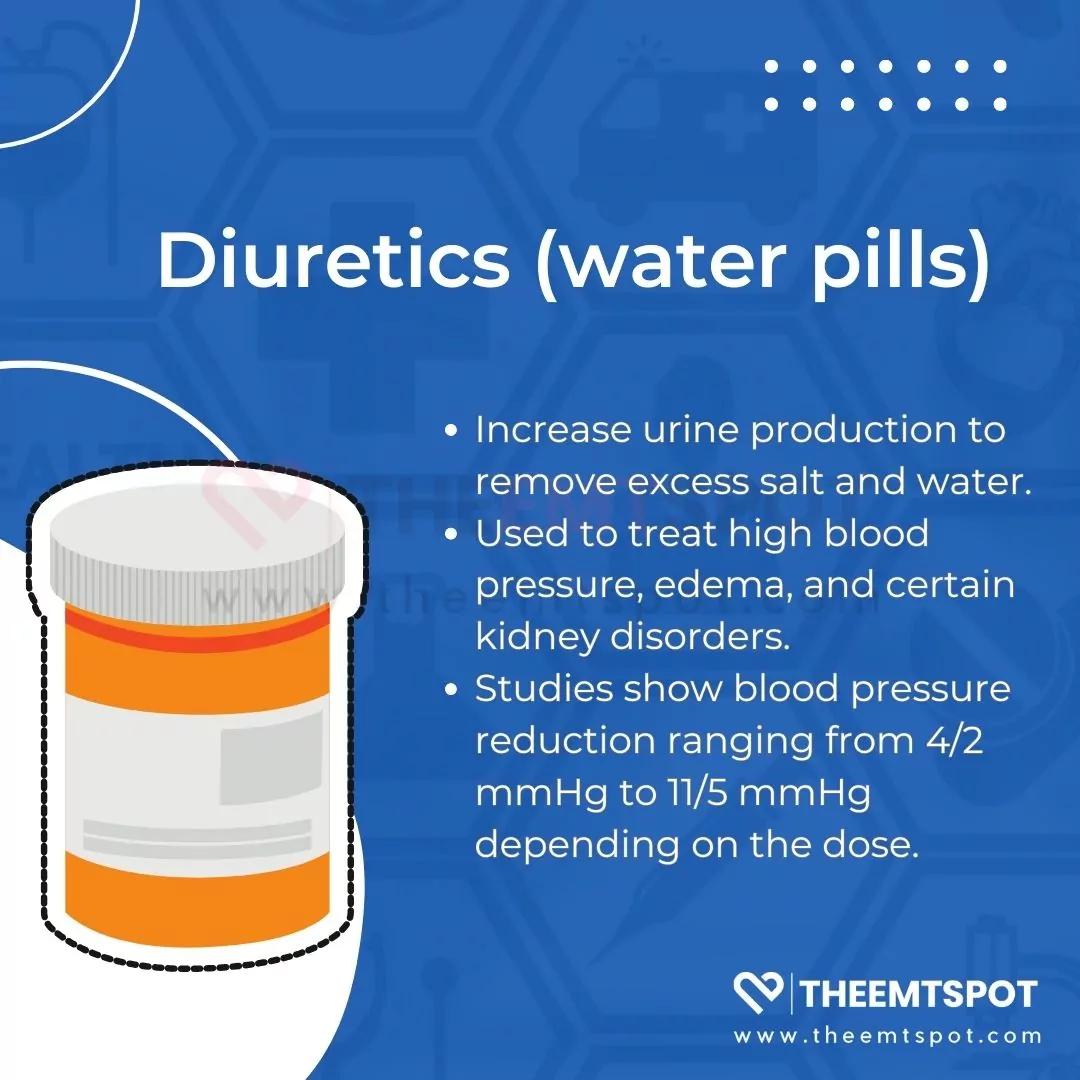
A diuretic is a medication that promotes the removal of excess salt and water from the body by increasing urine production.
Diuretics are often used to treat conditions like high blood pressure, edema (fluid retention), and certain kidney disorders.
Diuretics, also known as water pills, enhance kidney function by removing extra salt and water from the body through urine.
By doing so, they help lower blood pressure and manage conditions like heart failure by reducing fluid accumulation in the body.
Several studies back the efficacy of diuretics as a potential hypertensive medication.
A study titled “Blood pressure‐lowering efficacy of loop diuretics for primary hypertension” published in Cochrane Library reported that blood pressure-lowering effects of diuretics ranged from 4/2 mmHg to 11/5 mmHg, depending on the dose (ranging from 6.25 mg to 50 mg/day).
What are the benefits of diuretics?
Diuretics are especially effective in treating high blood pressure and have been shown to produce good results in various age groups, including older adults.
They are also generally well-tolerated, with fewer adverse side effects compared to other medications.
What are the most commonly used diuretics?
Several types of diuretics are included below.
- Thiazide diuretics like hydrochlorothiazide and chlorthalidone.
- Loop diuretics such as furosemide and bumetanide.
- Potassium-sparing diuretics, including spironolactone and amiloride.
- Carbonic anhydrase inhibitors like acetazolamide
Who can take diuretics?
Most people, including older adults, can take diuretics safely. They are commonly prescribed for conditions like high blood pressure, heart failure, and fluid retention due to various medical issues.
Who shouldn’t take diuretics?
People with certain conditions, such as severe kidney or liver problems, electrolyte imbalances, or those who are allergic to diuretics, should avoid them. It’s important to discuss this with a healthcare provider before starting diuretics.
Can pregnant women or children diuretics?
Pregnant women, breastfeeding mothers, and children should use diuretics only under medical supervision due to potential risks and lack of sufficient data on safety.
How should diuretics be taken?
Diuretics are usually taken orally, either once or twice a day. Consistency in timing is important for effectiveness. Some diuretics can also be administered intravenously during a hospital stay.
Are diuretics used for anything besides treating high blood pressure?
Apart from hypertension, diuretics are used to treat heart failure, pulmonary edema, renal failure, and conditions like diabetes insipidus and high intraocular pressure.
What are the potential side effects of diuretics?
Common side effects include increased urination, dizziness, tiredness, headache, gout, muscle cramps, dehydration, and electrolyte imbalances. In people with diabetes, diuretics can raise blood sugar levels.
What drugs and foods interfere with diuretics?
Diuretics can interact with various medications, and certain foods can influence their effects.
Regular monitoring of kidney function and potassium levels is recommended. Discussing potential interactions with a healthcare provider is crucial.
3. Angiotensin II receptor blockers (ARBs)
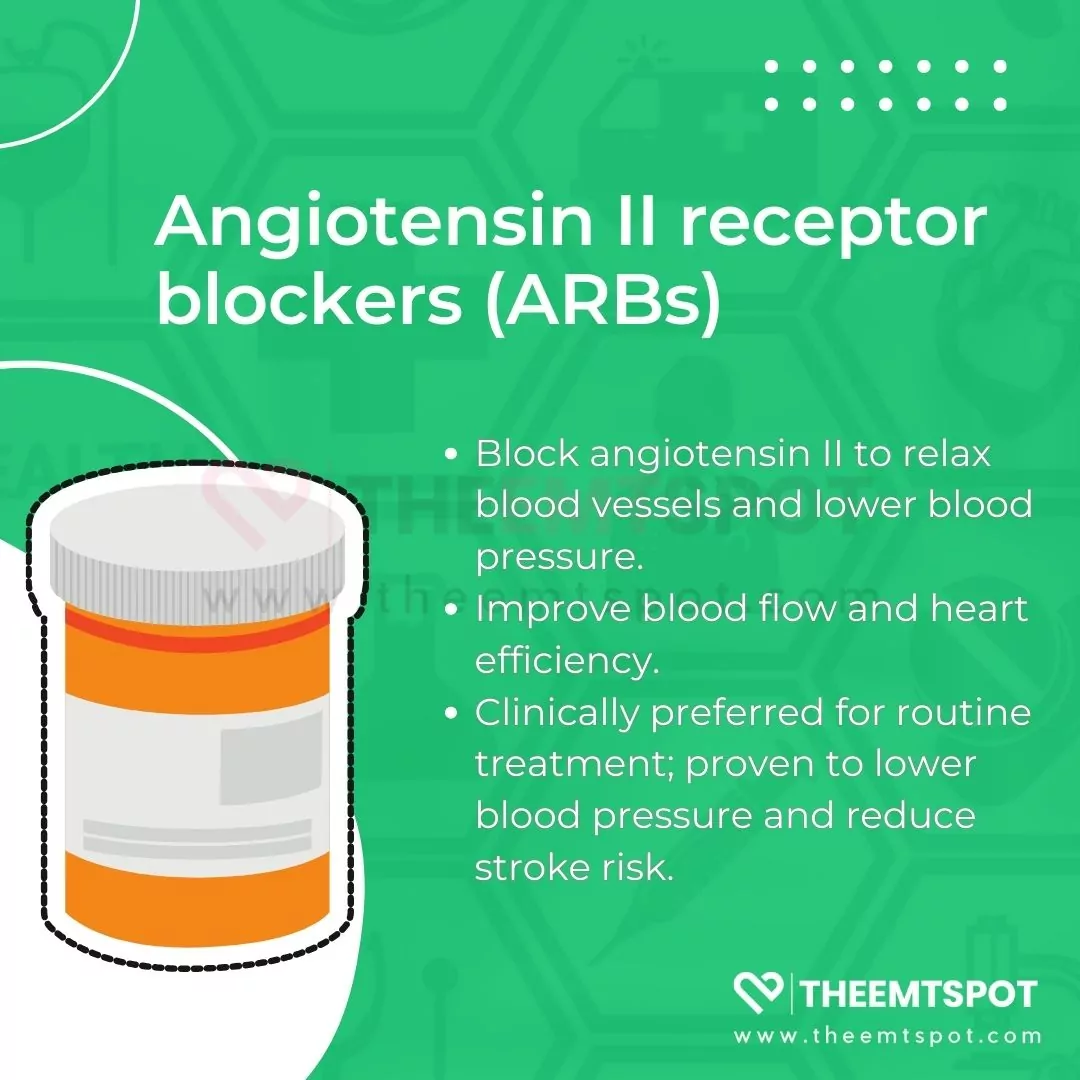
Angiotensin II Receptor Blockers (ARBs) function by blocking angiotensin II, a hormone that constricts blood vessels.
This action relaxes blood vessels, reduces blood pressure, and improves blood flow, helping the heart pump more efficiently.
Several scientific studies highlight the superior and effective action of ARBs, and many clinicians prefer using ARBs for routine treatment.
One of the popular studies, “Cardiovascular and cerebrovascular outcomes of long-term angiotensin receptor blockade,” examined the impact of ARBs on blood pressure and cardiovascular outcomes of 16864 patients.
It was concluded that ARBs significantly lowered blood pressure and reduced stroke risk but not other cardiovascular events in essential hypertension patients.
What are the benefits of ARBs?
They lower blood pressure, reduce strain on the heart, and are particularly beneficial for patients with high blood pressure and heart failure. ARBs also help prevent strokes and kidney problems related to diabetes.
What are the most commonly used ARBs?
Common ARBs include Losartan, Valsartan, and Irbesartan. Each varies slightly in its chemical structure and duration of action, allowing doctors to tailor treatment to individual patient needs.
Who can take ARBs?
ARBs are suitable for adults with high blood pressure, heart failure, or those who have had a heart attack. They’re often prescribed when patients experience side effects from ACE inhibitors, another blood pressure medication class.
Who shouldn’t take ARBs?
Patients with a history of angioedema (swelling under the skin) or those allergic to ARBs should avoid these medications. Additionally, people with severe kidney disease or liver problems may need alternative treatments.
Can pregnant women or children take ARBs?
ARBs are not recommended for pregnant women, especially in the second and third trimesters, due to potential harm to the developing fetus. The safety and effectiveness of ARBs in children have not been established.
How should ARBs be taken?
ARBs are usually taken orally, once or twice daily. Consistency in timing is key for effectiveness. Patients should follow their healthcare provider’s instructions regarding dosage and not alter or stop the medication without medical advice.
Are ARBs used for anything besides treating high blood pressure?
Besides hypertension, ARBs are used to treat heart failure, protect kidneys in patients with diabetes, and reduce the risk of stroke. They are sometimes prescribed post-heart attack for heart protection.
What are the potential side effects of ARBs?
Some of the prevalent adverse effects include dizziness, headache, and fatigue. Rarely, ARBs can cause kidney problems or high potassium levels.
Patients should be monitored for symptoms of swelling or difficulty breathing, which could indicate an allergic reaction.
What drugs and foods interfere with ARBs
ARBs can interact with NSAIDs, increasing the risk of kidney damage. They may also interact with lithium, leading to increased lithium levels.
A high-potassium diet or supplements should be avoided as ARBs can increase potassium levels.
4. Alpha-blockers
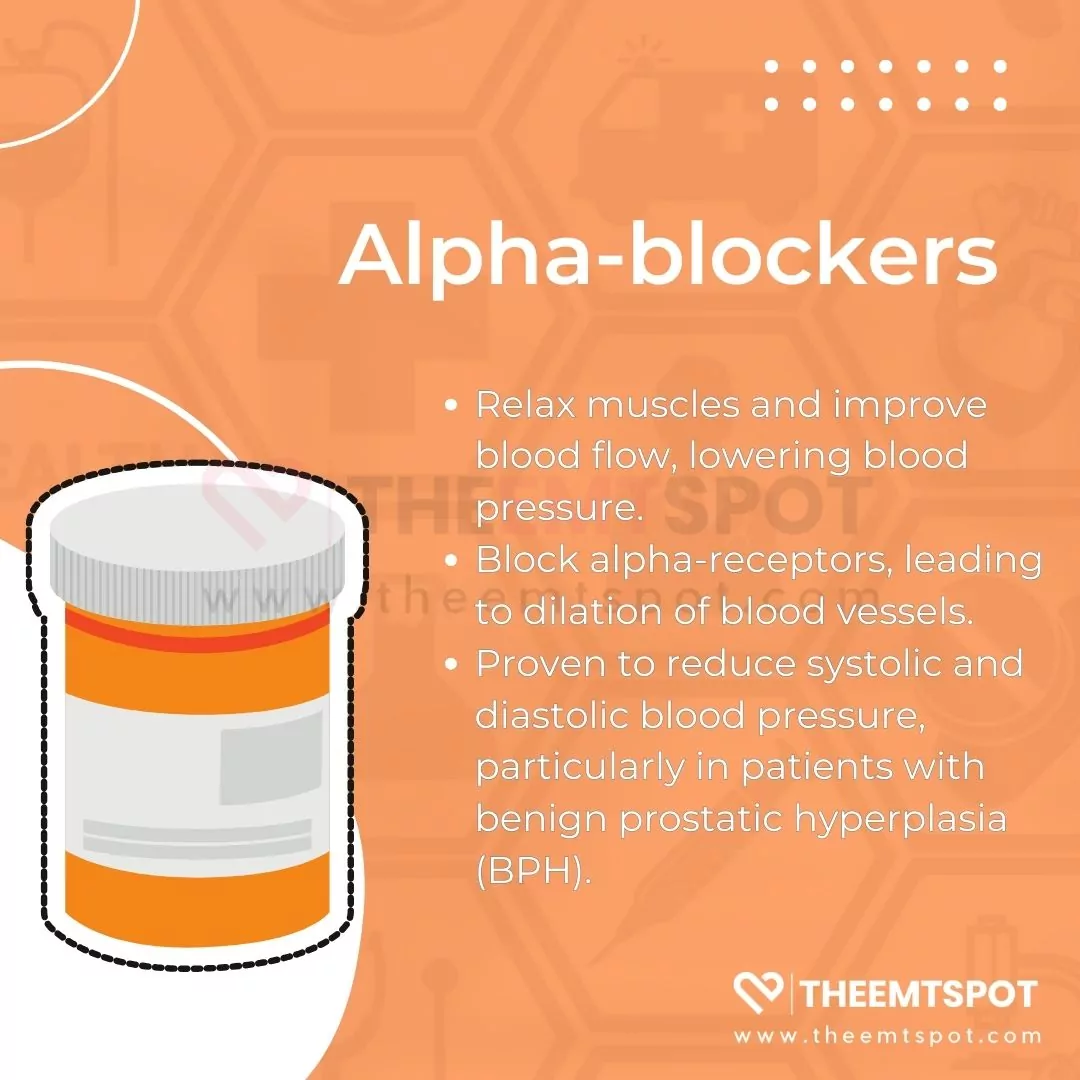
Alpha-blockers are medications that relax certain muscles and help improve blood flow. They are often used to lower blood pressure and to treat prostate problems in men.
Alpha-blockers function by inhibiting alpha-receptors found in cells throughout the body, particularly in blood vessels.
When these receptors are blocked, the affected cells stay relaxed, which leads to the dilation of blood vessels and, consequently, lower blood pressure.
In a Nature publication, Prof S H Lee and colleagues from Yonsei University Health System in Seoul, Korea, reported that alpha blockers significantly reduce systolic and diastolic blood pressure.
Interestingly, this reduction in blood pressure was an added benefit for volunteers being treated for benign prostatic hyperplasia.
In a Nature publication, Prof S H Lee and colleagues from Yonsei University Health System in Seoul, Korea, reported that alpha blockers significantly reduce systolic and diastolic blood pressure.
Interestingly, this reduction in blood pressure was an added benefit for volunteers being treated for benign prostatic hyperplasia.
What are the benefits of alpha-blockers?
Alpha-blockers are primarily effective in treating high blood pressure and conditions affecting the circulatory system. They are also used in managing prostate-related issues and certain types of tumors.
What are the most commonly used alpha-blockers?
Common alpha-blockers include non-selective options like phenoxybenzamine and selective A1 blockers like alfuzosin, doxazosin, prazosin, silodosin, tamsulosin, and terazosin.
Who can take alpha-blockers?
Alpha-blockers are suitable for individuals with hypertension, benign prostatic hyperplasia (BPH), and certain tumor types. They are often prescribed to those who need blood pressure management or prostate gland-related treatments.
Who shouldn’t take alpha-blockers?
People undergoing cataract surgery, those with a history of orthostatic hypotension, individuals taking certain erectile dysfunction medications, and those with kidney disease or circulatory issues may need to avoid alpha-blockers. Breastfeeding women should also be cautious.
Can pregnant women or children take it?
The use of alpha-blockers in pregnant women and children should be approached with caution and under strict medical supervision, considering the potential risks and lack of sufficient safety data.
How should alpha-blockers be taken?
Alpha-blockers are typically taken orally. The timing of doses can be important, especially for selective alpha-1 blockers, which may cause orthostatic hypotension. The first dose is often smaller to minimize this risk.
Are alpha-blockers used for anything besides treating high blood pressure?
Alpha-blockers are also used to treat benign prostatic hyperplasia (BPH), pheochromocytomas, and paragangliomas.
Off-label uses include treating nightmares associated with PTSD, Raynaud’s phenomenon, chronic prostatitis, and kidney stones.
What are the potential side effects of alpha-blockers?
Common side effects of alpha-blockers include low blood pressure, dizziness, sexual dysfunction, reflex tachycardia, and muscle tremors.
Non-selective alpha-blockers may cause extra norepinephrine, leading to additional side effects like fast heartbeat and shaking.
What drugs and foods interfere with alpha-blockers?
Alpha-blockers can interact with alcohol, citrus juices, other foods, and various medications. These interactions can vary between individuals, so it’s important to consult healthcare providers for personalized advice.
5. Alpha-beta-blockers
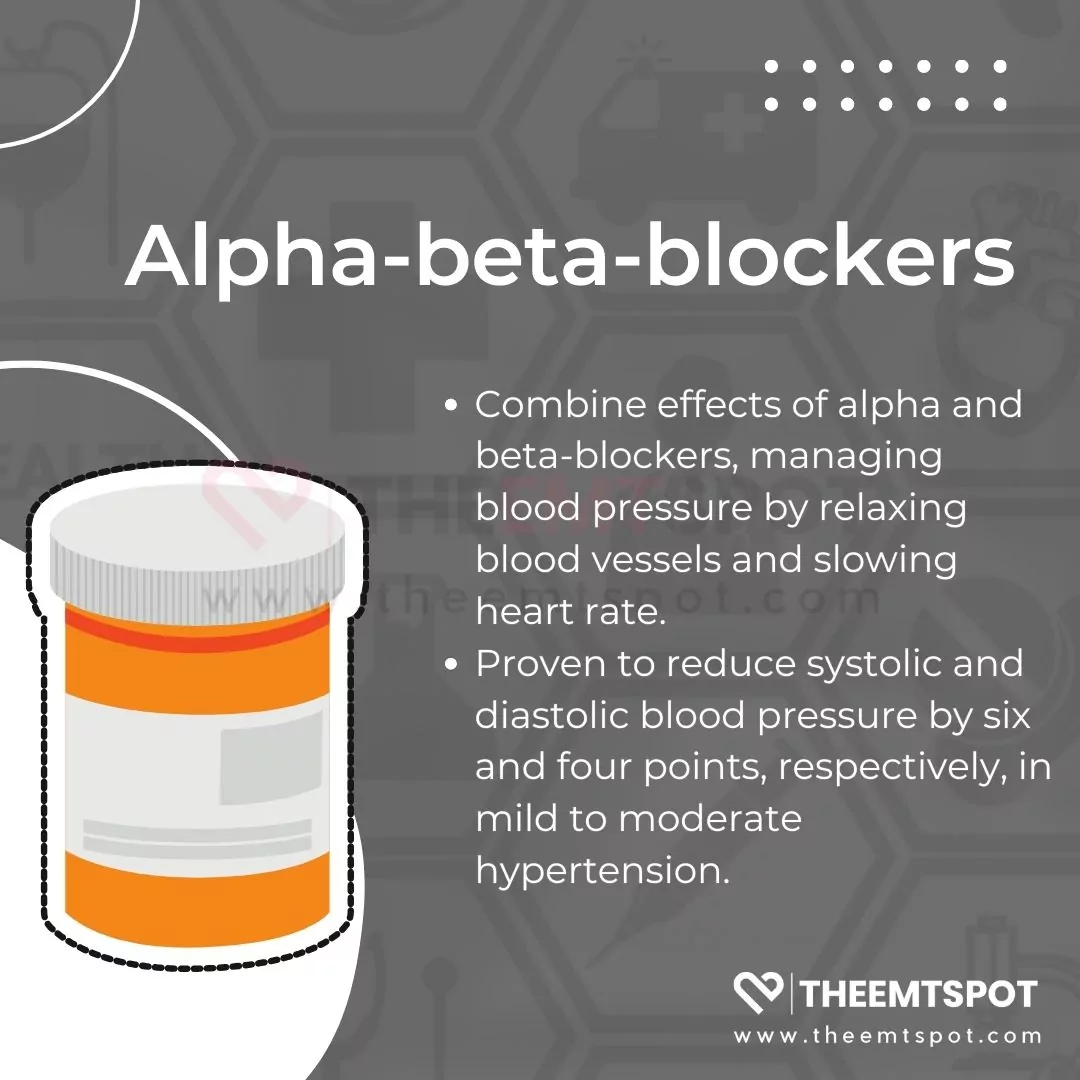
Alpha-beta adrenergic blockers are medications that combine the effects of alpha and beta-blocker medicines. These blockers are part of the adrenergic inhibitors class and help manage blood pressure.
These blockers act on receptor cells in the blood vessels, blocking catecholamines which narrow arteries.
This action helps relax blood vessels and lower blood pressure. They also slow the heart rate and reduce the force of heartbeats, further aiding in blood pressure management.
In a 2015 Cochrane review by Prof. Wong GWK and colleagues, three brands of alpha-beta-blockers were assessed for their impact on blood pressure.
The studies demonstrated an average reduction in systolic and diastolic blood pressure by six and four points, respectively, in patients with mild to moderate hypertension.
What are the benefits of alpha-beta-blockers
Alpha-beta blockers provide numerous advantages, such as lowering elevated blood pressure, enhancing cardiac performance in cases of heart failure, decreasing the occurrence and seriousness of cardiovascular incidents, and diminishing the likelihood of subsequent heart attacks in individuals with specific cardiac ailments.
What are the most commonly used alpha-beta-blockers?
The most common alpha-beta blockers include Carvedilol and Labetalol. These medications are often used in the treatment of high blood pressure and certain heart conditions.
They come in various formulations, such as tablets or extended-release capsules.
Who can take alpha-beta-blockers?
These blockers are recommended for individuals with hypertension and conditions like benign prostatic hyperplasia (BPH).
Beta-blockers, a component of alpha-beta blockers, are preferred for people with coronary artery disease and other heart conditions.
Who shouldn’t take alpha-beta-blockers?
Combining alpha and beta blockers can cause dangerous changes in heart rhythm and increase the risk of side effects like dizziness, fainting, and, in rare cases, sudden cardiac death.
Can pregnant women or children take alpha-beta-blockers?
In pregnant women, alpha-beta blockers, particularly carvedilol, have been associated with risks like neonatal hypoglycemia.
Routine monitoring of blood glucose levels in newborns exposed to these blockers is essential.
The safety of alpha-beta blockers in children is not clearly established; however, children with hypertension are typically started on different classes of medication, like ACE inhibitors or calcium channel blockers (CCBs).
How should alpha-beta-blockers be taken?
Specific instructions on taking alpha-beta blockers were not found in the available information. Usually, medication guidelines are provided by healthcare professionals based on individual patient needs.
Are alpha-beta-blockers used for anything besides treating high blood pressure?
Alpha-beta blockers are used not only for treating high blood pressure but also for managing certain heart conditions, like heart failure, chest pain (angina), and reducing the risk of future heart attacks.
What are the potential side effects of alpha-beta-blockers?
Side effects include dizziness, depression, diarrhea, dry eyes, slow heart rate, scalp tingling, sexual problems, skin rash, swelling of feet and legs, tiredness, and wheezing or shortness of breath in asthmatic individuals.
What drugs and foods interfere with alpha-beta-blockers?
Alpha-beta blockers can interact with certain foods and drugs. For example, they may interact with antihypertensives, leading to excessively low blood pressure.
Foods like high-sodium meals can decrease their effectiveness, while alcohol may amplify the medication’s blood pressure-lowering effects.
6. Beta-blockers
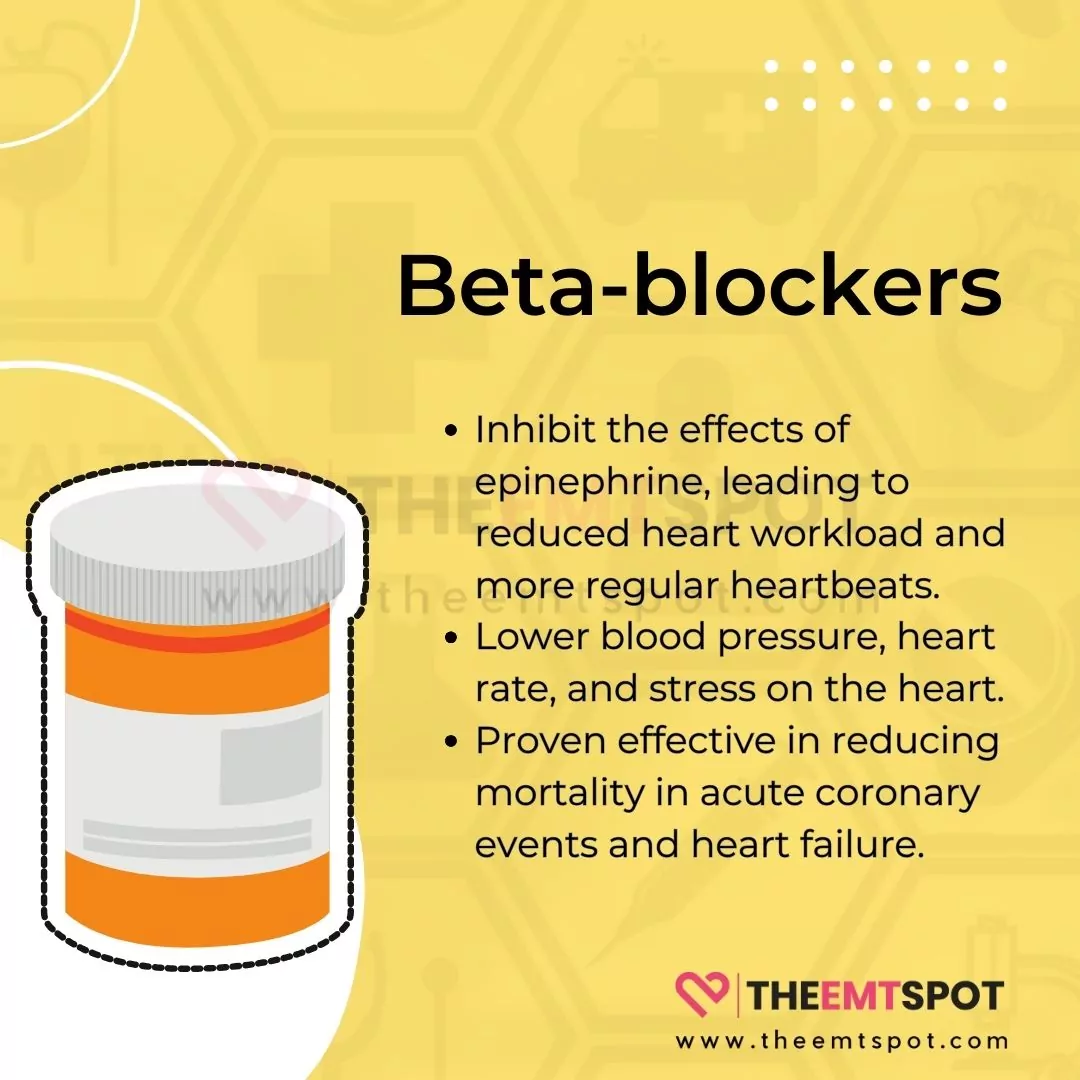
Beta-blockers, or beta-adrenergic blocking agents, are a group of drugs primarily employed for controlling irregular heart rhythms and safeguarding the heart against a subsequent heart attack following the initial one (secondary prevention).
Their mechanism of action involves inhibiting the impact of epinephrine, which is also referred to as adrenaline.
Beta-blockers decrease the heart’s workload and promote a more regular heartbeat by inhibiting the influence of specific natural substances in the body, such as epinephrine, on the heart and blood vessels.
Consequently, this leads to a reduction in blood pressure, heart rate, and the stress placed on the heart.
What is the proof of beta-blockers effectiveness?
A study by Oliver J. Ziff et al., published in BMC Medicine, analyzed 98 meta-analyses involving over 418,000 patients and found that beta-blockers effectively reduce mortality in acute coronary events and heart failure.
However, the efficacy varies depending on specific conditions and patient characteristics.
What are the benefits of beta-blockers?
Beta-blockers are beneficial in treating a variety of cardiovascular conditions, including high blood pressure, heart failure, chest pain (angina), and irregular heartbeats.
They are also used in managing certain types of tremors and for preventing migraines.
What are the most commonly used beta-blockers?
Common beta-blockers include propranolol, metoprolol, atenolol, and bisoprolol.
These medications vary in their specific properties, such as selectivity, intrinsic sympathomimetic activity, and lipid solubility, making certain types more suitable for specific conditions.
Who can take beta-blockers?
Beta-blockers are typically prescribed for individuals with cardiovascular conditions such as high blood pressure, angina, heart failure, and irregular heart rhythms.
They can also be used in patients who have had a heart attack to prevent future cardiac events.
Who shouldn’t take beta-blockers?
Beta-blockers are not recommended for people with certain conditions such as asthma, chronic obstructive pulmonary disease (COPD), and certain types of heart block or slower than normal heart rate (bradycardia).
Caution is also advised in diabetic patients, as beta-blockers can mask signs of low blood sugar.
Can pregnant women or children take it?
Beta-blockers should be used cautiously in pregnant women and children.
Certain beta-blockers may be safer during pregnancy, but the potential risks to the fetus should always be weighed against the benefits.
Pediatric use depends on the child’s specific condition and should be guided by a pediatrician.
How should beta-blockers be taken?
Beta-blockers are typically taken orally, with or without food. Dosage and timing depend on the specific type and the condition being treated.
It’s crucial to follow a healthcare provider’s instructions closely and not to stop taking them abruptly, as this can worsen heart conditions.
Are beta-blockers used for anything besides treating high blood pressure?
Besides high blood pressure, beta-blockers are used for treating heart rhythm disorders, angina, heart failure, and certain types of tremors.
They are also prescribed for migraine prevention, anxiety management, and in certain cases, for glaucoma treatment.
What are the potential side effects of beta-blockers?
Typical adverse effects of beta-blockers encompass tiredness, chilly extremities, reduced heart rate, and digestive symptoms.
Some people may experience sleep disturbances or depressive symptoms. Rarely, more severe effects like heart block or bronchospasm can occur.
What drugs and foods interfere with beta-blockers?
Beta-blockers can interact with other medications, including certain antidepressants, other blood pressure medications, and drugs for asthma or COPD.
They can also interact with alcohol, leading to increased drowsiness. Consuming grapefruit juice might disrupt the processing of certain beta-blockers within the body.
7. Calcium-channel blockers
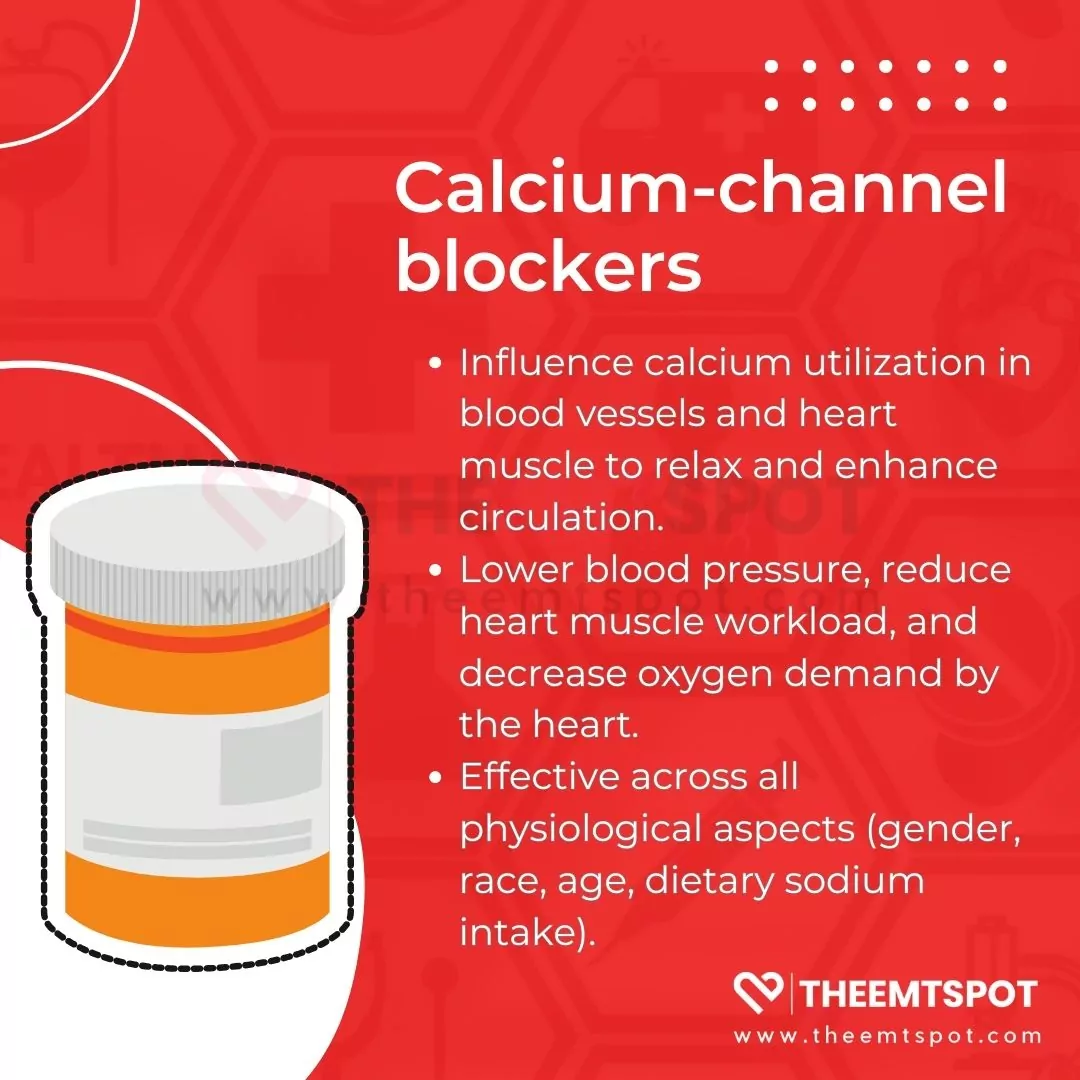
Calcium-channel blockers (CCBs) are a group of medications used primarily to manage high blood pressure, angina, and certain heart rhythm disorders.
Their mechanism of action involves influencing the utilization of calcium in blood vessels and heart muscle, which facilitates relaxation and enhances blood circulation.
CCBs block the entry of calcium into cells found in the heart and the walls of blood vessels.
This results in lower blood pressure, reduced heart muscle workload, and decreased oxygen demand by the heart, which is particularly beneficial in treating conditions like hypertension and angina.
The drug’s efficacy is emphasized in a study featured in Professor William J. Elliott’s article in the Journal of Clinical Hypertension.
In contrast to their counterparts, calcium-channel blockers function across all physiological aspects, irrespective of gender, race/ethnicity, age, and dietary sodium intake.
What are the benefits of calcium-channel blockers?
Calcium-channel blockers are effective in lowering blood pressure, reducing chest pain from angina, and controlling certain types of irregular heartbeats.
Utilizing them can result in a reduced likelihood of experiencing a stroke or heart attack linked to elevated blood pressure.
What are the most commonly used calcium-channel blockers?
The most common calcium-channel blockers include amlodipine, diltiazem, and verapamil. These medications differ in their exact mechanism of action and duration of effect, making them suitable for various therapeutic uses based on individual patient needs.
Who can take calcium-channel blockers?
Doctors frequently recommend calcium-channel blockers to adults who have hypertension, angina, and specific heart rhythm irregularities. They are especially beneficial in patients who cannot tolerate other types of blood pressure medications.
Who shouldn’t take calcium-channel blockers?
Individuals with a known hypersensitivity to calcium-channel blockers, severe low blood pressure, heart failure, or certain heart block conditions should avoid these medications.
Cautious use is advised in elderly patients, and those with liver disorders, as adjustments in dosage may be necessary.
Can pregnant women or children take calcium-channel blockers?
Calcium-channel blockers are generally not recommended during pregnancy unless absolutely necessary, as their safety has not been fully established.
For children, the use of these medications is rare and should be guided by a pediatric cardiologist based on specific medical conditions.
How should calcium-channel blockers be taken?
Calcium-channel blockers are typically taken orally, either as a tablet or capsule.
They can be prescribed as a short-acting or long-acting formulation, depending on the patient’s needs. It’s important to follow the dosage and timing as prescribed by a healthcare provider.
Are calcium-channel blockers used for anything besides treating high blood pressure?
In addition to hypertension, calcium-channel blockers are successfully employed in the treatment of chest pain (angina) and particular forms of irregular heart rhythms.
They are also sometimes prescribed for Raynaud’s phenomenon, migraine prevention, and certain forms of hypertrophic cardiomyopathy.
What are the potential side effects of calcium-channel blockers?
Common side effects of calcium-channel blockers include headache, flushing, dizziness, and swollen ankles or feet.
Some may experience palpitations or gastrointestinal symptoms. Severe side effects, though rare, can include low blood pressure, heart failure, and liver dysfunction.
What drugs and foods interfere with calcium-channel blockers?
Calcium-channel blockers can interact with other medications, including beta-blockers, digoxin, and certain statins.
Grapefruit juice can affect the metabolism of some CCBs, leading to increased medication levels and risk of side effects.
8. Central agonists
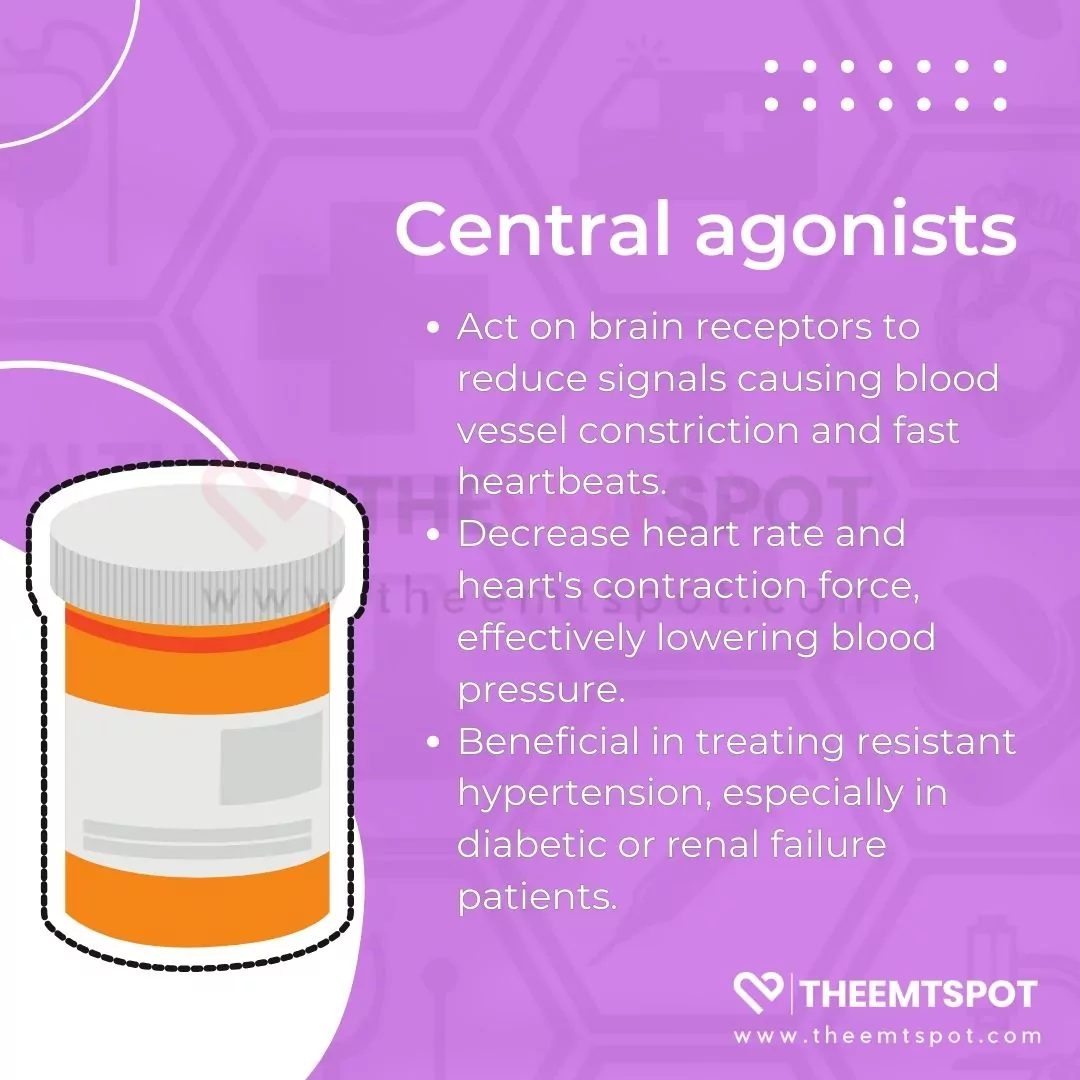
Central agonists are a class of medications primarily used in the treatment of high blood pressure.
They act on receptors in the brain instead of heart muscles or blood vessels, thereby reducing the signals that cause blood vessels to constrict or the heart to beat faster.
Central agonists work by stimulating receptors in the brain, which, in turn, signals the blood vessels to relax and dilate.
This action helps to decrease the heart rate and reduce the force of the heart’s contractions, effectively lowering blood pressure.
A clinical review published in the Journal of Clinical Hypertension in 2007 clearly highlights the efficacy of this drug.
According to the author, central agonist use is beneficial in treating resistant hypertension, particularly in diabetic or renal failure patients, as well as in cases of heart failure with hypertension.
What are the benefits of central agonists?
The primary benefit of central agonists is their effectiveness in lowering high blood pressure, especially in cases where other medications may not be effective.
They can be particularly useful in patients with severe hypertension or in those who have had limited success with other antihypertensive drugs.
What are the most commonly used central agonist?
Common central agonists include clonidine, methyldopa, and guanfacine. These drugs come in different forms, such as oral tablets and transdermal patches, offering versatility in their delivery to accommodate the patient’s requirements and response to treatment.
Who can take central agonists?
Central agonists are typically prescribed for adults with high blood pressure, particularly those who have not achieved blood pressure control with other medications.
They may also be used in certain cases of opioid withdrawal or attention deficit hyperactivity disorder (ADHD).
Who shouldn’t take central agonists?
Individuals with a history of depression or certain heart conditions or those who are pregnant or breastfeeding may need to avoid central agonists.
These drugs can interact with other drugs, so a comprehensive medical history and medication review are essential before starting treatment.
Can pregnant women or children take central agonists?
Central agonists are generally not recommended for pregnant women due to potential risks to the fetus.
In children, their use is limited and should be guided by a pediatrician, often for specific conditions like attention deficit hyperactivity disorder (ADHD).
How should central agonists be taken?
Central agonists are usually taken orally in pill form, with some available as a transdermal patch.
Dosages vary based on the specific medication and the patient’s condition. Consistent adherence to prescribed dosages and schedules is crucial for effective management of blood pressure.
Are central agonists used for anything besides treating high blood pressure?
Besides hypertension, central agonists like clonidine are used in the treatment of ADHD, certain pain conditions, and opioid withdrawal symptoms.
Their ability to calm the central nervous system makes them versatile for various medical applications.
What are the potential side effects of central agonists?
Common side effects of central agonists include dry mouth, drowsiness, and dizziness. Some patients may experience constipation, headache, or fatigue.
Abrupt discontinuation can rapidly increase blood pressure, so it’s important to follow the doctor’s instructions for stopping the medication.
What drugs and foods interfere with central agonsist?
Central agonists can interact with other medications, including antidepressants, sedatives, and other blood pressure medications, potentially leading to enhanced effects or adverse reactions.
Alcohol consumption should be limited as it can increase drowsiness and dizziness.
9. Vasodilators
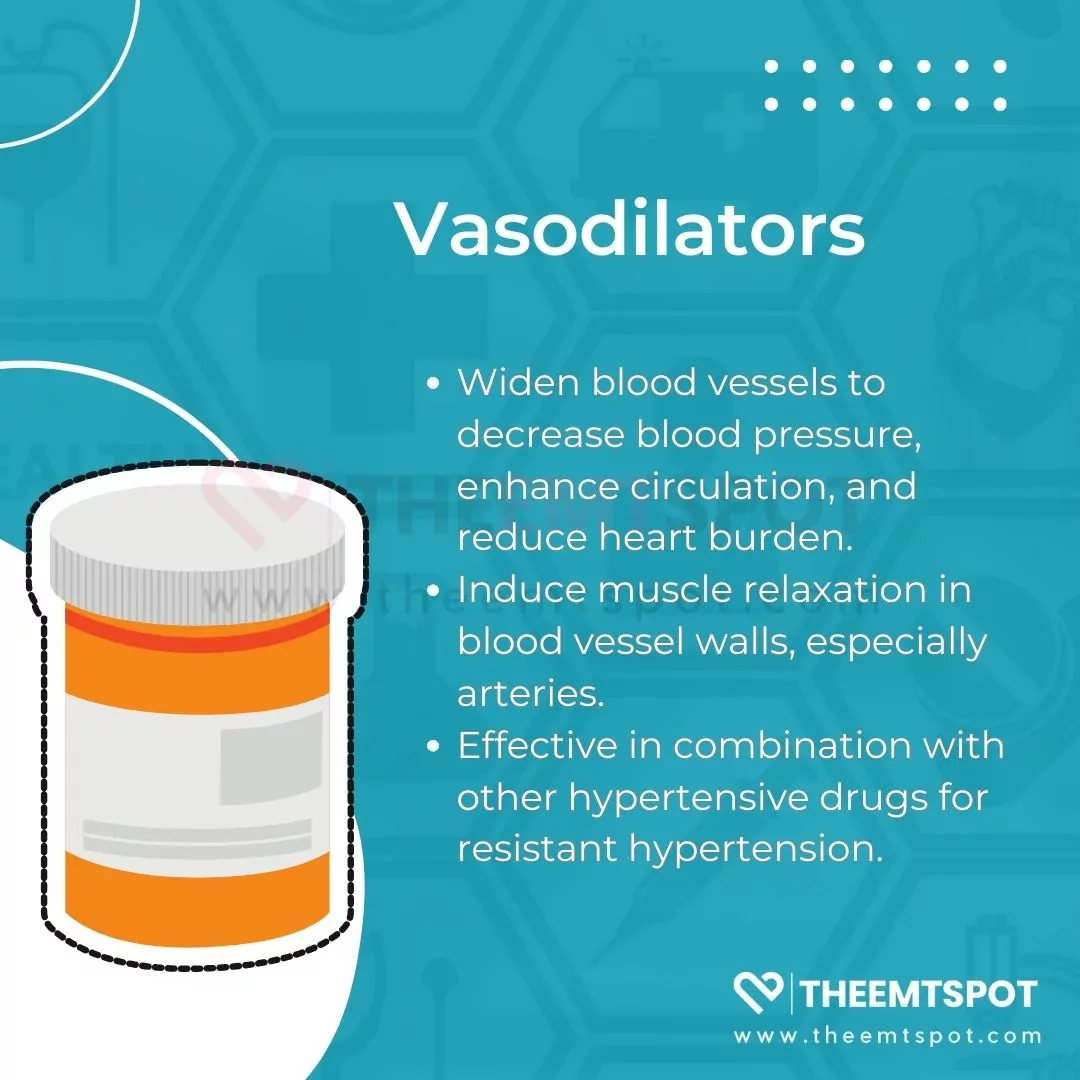
Vasodilators belong to a class of drugs that widen blood vessels, leading to decreased blood pressure, enhanced blood circulation, and a reduced burden on the heart.
They find frequent applications in managing conditions such as hypertension, heart failure, and specific forms of angina.
Vasodilators function by inducing relaxation in the muscles lining the walls of blood vessels, especially arteries.
This relaxation permits the vessels to expand, lowering blood pressure and increasing the delivery of oxygen-rich blood to the heart muscle.
Vasodilators are effective when used in combination with other classes of hypertensive drugs.
This is reported in a review published in the journal Comprehensive Therapy by Dr. K J Osterziel and Dr. S Julius.
They reported that when vasodilators are used with sympatholytic agents and diuretics, they can effectively reduce resistant hypertension.
What are the benefits of vasodilators?
The primary benefit of vasodilators is their effectiveness in lowering high blood pressure and reducing the strain on the heart. This can lead to a decreased risk of stroke, heart attack, and heart failure.
They are also beneficial in improving symptoms in patients with certain types of heart and vascular conditions.
What are the most commonly used vasodilators?
Common vasodilators include hydralazine and nitroglycerin. Depending on the patient’s condition and treatment requirements, these medications can be administered in various forms, such as oral tablets, sublingual tablets, transdermal patches, or intravenous injections.
Who can take vasodilators?
Vasodilators are primarily prescribed for adults with high blood pressure, heart failure, or angina.
They can be particularly beneficial for patients who do not respond adequately to other types of blood pressure-lowering medications.
Who shouldn’t take vasodilators?
Individuals with low blood pressure, certain types of heart valve disease, or those prone to hypotension should avoid vasodilators.
Caution is advised in patients with kidney problems. As with any medication, it’s important to discuss your health history with a healthcare provider before starting vasodilators.
Can pregnant women or children take vasodilators?
Vasodilators should be used with caution in pregnant women and children. Some vasodilators may be prescribed during pregnancy if the benefits outweigh the risks, but this should be carefully assessed by a healthcare provider.
Their use in children is rare and typically occurs under specialist supervision.
How should vasodilators be taken?
Vasodilators are available in various forms, including oral tablets, capsules, sublingual tablets, and injections.
The method of administration depends on the specific type of vasodilator and the condition being treated.
Are vasodilators used for anything besides treating high blood pressure?
Apart from treating high blood pressure, vasodilators are also used in managing conditions like heart failure and certain types of angina (chest pain).
Additionally, they are used in treating pulmonary hypertension and in certain diagnostic procedures involving blood vessel dilation.
What are the potential side effects of vasodilators?
Common side effects of vasodilators include headaches, swelling of the legs or ankles, dizziness, and a rapid heartbeat.
Some individuals may experience flushing or nasal congestion. Severe side effects can include significant drops in blood pressure and heart complications.
What drugs and foods interfere with vasodilators?
Vasodilators can interact with other medications, including blood pressure drugs, erectile dysfunction medications, and certain over-the-counter cold and flu medications.
Alcohol can also amplify the blood pressure-lowering effects of vasodilators, leading to dizziness or fainting.
What are the best medications for high blood pressure?
When it comes to treating blood pressure, the best medication depends on the individual physiology, severity of hypertension, comorbidities, age, sex, gender, etc.
For individuals with general hypertension, thiazide diuretics like hydrochlorothiazide are often the best. These medications are effective and have minimal side effects.
Patients with kidney problems, particularly those with diabetes, are often prescribed ACE inhibitors (ACEIs) or Angiotensin II Receptor Blockers (ARBs).
Examples include lisinopril (an ACE inhibitor) and losartan (an ARB). These drugs safeguard kidney function by reducing pressure and protecting against kidney damage.
Patients dealing with heart disease typically receive beta-blockers, such as metoprolol, which reduce the heart’s workload and promote regular heartbeats.
Calcium channel blockers like amlodipine are also common, especially when beta-blockers alone are insufficient or for angina.
ACE inhibitors or ARBs are the best choice for diabetic patients due to their kidney-protective properties, addressing a common concern in diabetes.
In the elderly population, calcium channel blockers and thiazide diuretics are often preferred, as they are effective with a lower risk of side effects.
For African-American patients, calcium channel blockers and thiazide diuretics are deemed the best for blood pressure control.
Pregnant women are typically prescribed methyldopa and nifedipine due to their safety profile during pregnancy.
What are the best medications for low blood pressure?
Treating hypotension, or low blood pressure, involves a personalized approach, taking into account the underlying causes, the severity of your symptoms, and physiological aspects.
Dr. Amy C. Arnold and Dr. Cyndya Shibao from Vanderbilt University School of Medicine published a review titled “Current Concepts in Orthostatic Hypotension Management,” in which they elaborate on various hypotension treatment regimens.
From the review, it was understood that non-pharmacological interventions are the first preference, followed by medications.
For mild cases of hypotension, increased salt intake and hydration are often the best choices. Medications are usually not the first line of treatment unless the hypotension is severe or symptomatic.
Fludrocortisone, a mineralocorticoid, is commonly prescribed to increase blood volume. Midodrine is also used, which increases blood pressure by narrowing blood vessels.
These drugs benefit patients experiencing significant blood pressure drops upon standing.
Medications like beta-blockers (e.g., propranolol) can effectively reduce symptoms by regulating heart rate and blood pressure responses.
In cases of hypotension with shock, intravenous fluids and vasopressors like dopamine, norepinephrine, or epinephrine are typically used in a hospital setting to rapidly raise blood pressure.
Adjusting or changing the medication causing the hypotension is often the first step. A healthcare provider might lower the dose or switch to a different class of drugs.
Careful management is needed due to the risk of falls and injuries. Non-pharmacological approaches like compression stockings and careful hydration are often preferred. Medication is used if these measures are not effective.
Non-drug treatments like compression stockings and increased fluid and salt intake are usually the best approach due to the safety concerns with medications during pregnancy.
Can you drink alcohol while on blood pressure medications?
Drinking alcohol while on blood pressure medications can have adverse effects.
Alcohol can interact with these drugs, potentially leading to dizziness, drowsiness, and dangerously low blood pressure.
It can also diminish the effectiveness of the medication, making it less capable of controlling blood pressure.
Dr. Rowena Sobczyk, MD, the medical director of Resperate, discussed this in her channel ‘Ask Dr. Rowena,’ stating:
“Different medicines interact differently with alcohol.”
She added:
“Two common medicines used to control blood pressure are beta blockers and ACE inhibitors. Beta-blockers can cause your blood pressure to rise when you drink alcohol because the alcohol makes the beta-blocker less effective. Conversely, an ACE inhibitor combined with alcohol can lower your blood pressure too much.”
This emphasizes the need to seek guidance from your doctor/family physician for personalized recommendations, as the impact of alcohol can vary depending on the specific medication and individual health factors.
In many cases, moderation or complete avoidance of alcohol is recommended for those on blood pressure medications.
Dr. Rowena’s advice to “talk to your own doctor about drinking while you are not only on blood pressure medicines but on any medicine” further reinforces this point.
How long after drinking alcohol can I take blood pressure medications?
The timing of taking blood pressure medications after consuming alcohol depends on several factors, including the type of medication and the amount of alcohol consumed.
Generally, it is advised to wait a few hours after drinking alcohol before taking blood pressure medications. The exact time to wait can vary, but a common recommendation is to wait at least 2 hours after moderate drinking.
However, there are concerning studies suggesting that alcohol consumption during blood pressure treatment might have adverse effects.
For instance, a review reported in the journal Current Hypertension Reports by Dr. Flávio Danni Fuchs and colleagues examined the acute and chronic effects of alcohol on blood pressure (BP) and the incidence of hypertension.
It was found that moderate alcohol in the system temporarily decreases blood pressure for up to 12 hours, followed by a spike when its effects wear off.
Thus, consuming a blood pressure medication during this 12-hour window might lead to a dangerous drop in blood pressure.
To avoid potential interactions and the risk of adverse effects, such as an excessive drop in blood pressure, it’s prudent to allow some time for the alcohol to metabolize before taking hypertension drugs.
However, this can vary based on individual health conditions and the specific blood pressure medication. It’s always best to consult with your doctor on this matter for personalized advice.
Which blood pressure medications should you avoid when you have kidney disease?
In patients with kidney disease, certain blood pressure medications need to be used with caution or avoided.
A study conducted at the University of Virginia School of Medicine has sparked worries about the potential for kidney damage associated with the extended usage of medications often prescribed for hypertension and heart failure, such as ACE inhibitors and angiotensin receptor blockers (ARBs).
The study found that long-term use of these medications was linked to kidney vessel hardening in mice and humans, despite their common use for high blood pressure and heart failure and their kidney-protective effects in non-kidney disease patients.
Conversely, the National Institute of Diabetes and Digestive and Kidney Diseases (NIDDK) suggests that medications like ACE inhibitors and ARBs have the potential to considerably delay the advancement of kidney disease in numerous patients.
This indicates that while long-term use of these drugs might pose risks, they can also be beneficial in managing kidney disease and hypertension, suggesting a need for careful management and monitoring.
Thus, the choice of blood pressure medication in patients with kidney disease requires careful consideration of the risks and benefits and should be closely managed by your doctor.
Which blood pressure medications should be avoided when you have liver disease?
In patients with liver disease, particularly decompensated cirrhosis, certain blood pressure medications should be avoided or used with caution.
According to a Samford University professor team’s report on US Pharmacist, it is advised to steer clear of angiotensin-converting enzyme inhibitors and angiotensin receptor blockers in individuals with decompensated cirrhosis because of the potential for kidney dysfunction.
In such patients, blood pressure can decrease over time, often due to the activation of the renin-angiotensin-aldosterone system.
For those with compensated cirrhosis, ACEIs and ARBs can still be used, but blood pressure should be monitored frequently.
Additionally, calcium channel blockers (CCBs) can be utilized to manage blood pressure in liver disease patients.
However, they should be used at the lowest possible dose and monitored closely, as many antihypertensive medications can result in supratherapeutic levels due to reduced hepatic clearance.
Can dietary supplements interfere with blood pressure medication?
Dietary supplements can indeed interfere with blood pressure medications.
According to an American Heart Association editorial article titled ‘Medication Interactions: Food, Supplements, and Other Drugs,’ some foods, even healthy ones, might interfere with blood pressure medication.
A notable example is grapefruit and grapefruit juice, known for their ability to disrupt the effectiveness of specific blood pressure-reducing medications.
This interference may lead to increased levels of these drugs in the bloodstream, elevating the risk of experiencing adverse effects.
St. John’s Wort (Hypericum perforatum), a commonly used supplement, induces liver enzymes and can reduce the concentration of various medications in the blood, including some blood pressure medications.
Another example is vitamin E, which can interfere with anticoagulants like Coumadin (used to treat heart attacks) and enhance their blood-thinning effects, potentially increasing the likelihood of internal bleeding.
Over-the-counter antihistamines, often used for allergies, can also interact with blood pressure medications, potentially causing an increase in blood pressure and heart rate when used together.
These interactions underscore the importance of consulting healthcare providers before taking any dietary supplements or over-the-counter medications in conjunction with prescribed blood pressure treatments.
What lifestyle changes can make blood pressure medication more beneficial?
Making adjustments to one’s lifestyle can significantly enhance the effectiveness of blood pressure medication.
A study from Zhengzhou University, published in the Journal of Clinical Hypertension, outlines the comprehensive effects of lifestyle modifications on hypertension control.
According to the publication, key lifestyle changes that can augment the benefits of blood pressure medication are listed below.
- Maintaining a healthy body mass index (BMI): Proper weight management can reduce systolic blood pressure.
- Dietary adjustments: Reducing salt, sodium, and fat intake while adding more fruits and vegetables to the diet.
- Reducing alcohol consumption and smoking: Both factors have a significant impact on blood pressure.
- Regular exercise: It helps manage blood pressure and overall cardiovascular health.
- Minimizing stress: Techniques for stress management can positively influence blood pressure.
According to the authors, these lifestyle changes can lower systolic reading by approximately 3.5 mmHg, thus reducing the risk of cardiovascular disease by roughly 30%, irrespective of genetic susceptibility to hypertension.
The study underscores that these behaviors affect blood pressure by modulating factors such as visceral fat accumulation, insulin resistance, and vascular endothelial function.
What should you do if your blood pressure medication doesn’t work?
When blood pressure medication doesn’t work, exploring various factors and considering alternative solutions is essential.
Consult your doctor to review medication usage and address potential causes like ‘white coat’ hypertension, incorrect medication intake, or drug interactions. Ensure accurate blood pressure monitoring at home and doctor’s offices.
Dietary changes can significantly impact blood pressure control, such as adopting a low-sodium DASH diet and lifestyle modifications like weight loss, increased physical activity, and smoking cessation.
If these measures are insufficient, your doctor may explore other underlying medical conditions or refer you to a hypertension specialist for more specialized care.
Additionally, alternative approaches such as meditation, yoga, and exercise regimens, as the American Heart Association suggested, can be adjunct methods for managing blood pressure.
When should you stop taking blood pressure medication?
Deciding when to discontinue blood pressure medication should always be done under the guidance of a healthcare professional.
According to a 2023 study in Clinical Hypertension by Prof. Hae-Young Lee et al., antihypertensive medications, traditionally considered lifelong therapy, can sometimes be reduced or discontinued in patients whose blood pressure has been well-controlled for an extended period.
However, this is not universally applicable and depends on individual health conditions.
The study found that a limited number of patients could successfully stop their medication over six months.
It is crucial to screen the right patients, evaluate their condition, and determine how to gradually reduce the medications.
It’s important to never stop or alter medication without consulting a healthcare provider, as they can best assess your individual health needs and risks.
What if you took blood pressure pills twice?
Taking blood pressure medication twice can lead to various side effects, largely depending on the specific class of the drug.
Immediate consequences include a decreased heart rate, often described as a heart-sinking feeling, and hypotension (low blood pressure).
“Accidentally doubling a dose of blood pressure medication can have varying effects depending on the drug class and individual response,” explains Dr. Milena Locci de Oliveira, a Pharmacist and Doctor of Philosophy in Sciences from the University of São Paulo (USP).
“Potential consequences include decreased heart rate, hypotension, and, in cases of certain antihypertensives like beta-blockers and diuretics, more severe reactions such as significant bradycardia or bronchoconstriction.”, she added.
“Common symptoms of overdose are nausea, dizziness, chest tightness, and, in sensitive individuals, severe dizziness or loss of consciousness.”
Dr. Oliveira emphasizes the importance of adhering to prescribed dosages to avoid these risks.
How often should you monitor blood pressure while on medication?
Monitoring blood pressure while on medication is crucial for managing hypertension effectively.
According to the 2017 Guidelines for High Blood Pressure in Adults by the American College of Cardiology, the frequency of monitoring varies depending on the stage of hypertension and associated risks.
For instance, individuals with stage 1 hypertension and high atherosclerotic CVD (ASCVD) risk should have their blood pressure rechecked in 1 month.
Those with stage 2 hypertension should also be evaluated within 1 month of diagnosis, receiving a combination of nonpharmacologic therapy and antihypertensive drugs.
The Mayo Clinic suggests beginning home blood pressure monitoring at least twice daily, once in the morning before eating or taking any medications and again in the evening.
It’s important to take two or three readings each time to ensure accuracy. Blood pressure can vary throughout the day, often being higher in the morning and might be slightly lower at home than in a medical office.
It is also crucial that you consult with your doctor to double-check the monitoring strategy to ensure accuracy.
What are the best and most accurate blood pressure monitors to use at home?
The best and most accurate blood pressure monitors for home use are Oxiline Pressure X Pro and CheckMe BP2, both of which are top-of-the-line home-based smart blood pressure monitors.
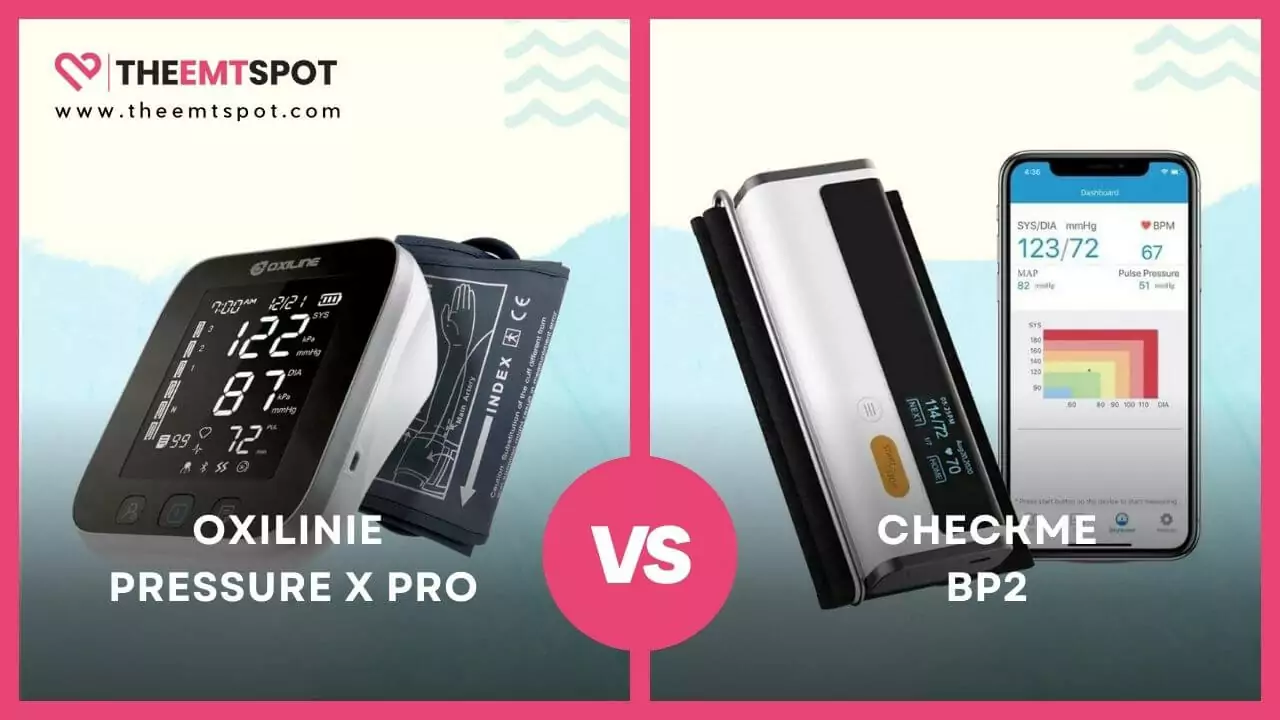
You can pair these monitors with your mobile device and view all the details on your smartphone, making it an efficient approach.
A side-by-side comparison of these two products is given below to help you understand the features suitable for your needs.
Oxiline Pressure X Pro
- Type: Cuffed with tube
- Smart feature(s): FDA 510 (k) granted. Mobile app support. VIBRA™ TX sensor for detecting arterial pressure. Bluetooth connectivity. Lifetime warranty.
- Number of users this device can support: Multi-user support via app.
- Number of readings per user: 120 readings on the device. Unlimited app storage.
- Weight of the device: 453 g.
CheckMe BP2
- Type: Cuffed tubeless
- Smart feature(s): Mobile app support. ECG with AI analysis. Wi-Fi and bluetooth connectivity. Rechargeable. OLED screen. Real-time tracking.
- Number of users this device can support: Multi-user support via app.
- Number of readings per user: 50 BP readings on the device. 10 EKG readings on the device. Unlimited app storage.
- Weight of the device: 240 g.
Oxiline stands out as the most dependable option available. With FDA 510(k) approval and its advanced smart Bluetooth connectivity, it’s a state-of-the-art product.
Many healthcare professionals endorse it for precise at-home blood pressure measurements.
On the other hand, CheckMe BP2 excels due to its lightweight design and smartphone connectivity feature.
It sets itself apart by its sleek form without a cuff, making it an extremely portable and clinically accurate blood pressure measurement tool.
You might also consider alternative models like Withings BPM Connect, Omron Silver, and QardiArm.
However, remember that owning a blood pressure monitor is just one aspect; ensuring its calibration for precise readings is equally essential.
What your blood pressure reading mean according to AHA’s BP chart?
Understanding your blood pressure reading is crucial for heart health. The American Heart Association (AHA) provides a blood pressure chart to help interpret these readings.
- Normal: Blood pressure less than 120/80 mm Hg is considered normal. Maintaining heart-healthy habits is advised.
- Elevated: Readings consistently ranging from 120-129 systolic and less than 80 diastolic indicate elevated blood pressure, a precursor to hypertension if not managed.
- Hypertension Stage 1: Consistent readings of 130-139 systolic or 80-89 diastolic. Lifestyle changes and possibly medication are recommended.
- Hypertension Stage 2: Blood pressure consistently at 140/90 mm Hg or higher. A combination of medications and lifestyle changes is often necessary.
- Hypertensive Crisis: Readings exceeding 180/120 mm Hg require immediate medical attention. This is a critical condition that may lead to organ damage.
Systolic blood pressure (the upper number) generally receives more focus, especially in individuals over 50, due to its stronger association with cardiovascular risks. However, both systolic and diastolic readings are important for diagnosing high blood pressure.
How to lower blood pressure instantly?
As techniques recommended by Carmen Pope, Clinical Pharmacologist for drugs.com, below are ways to lower blood pressure instantly.
- Breathing exercises: Practicing deep breathing exercises can slow the heart rate and promote relaxation. According to the Japanese Society of Hypertension, it is advised to perform six deep breaths in a span of 30 seconds as a method to lower blood pressure.
- Resting: Lying down and resting for 10 minutes can lower blood pressure quickly. A study showed that resting in the supine position for 10 minutes effectively lowers blood pressure compared to sitting.
- Dietary changes: Following a diet rich in greens, fruits, and whole grains can reduce inflammation and lower blood pressure. Flavanol-rich foods like berries, apples, and nuts are particularly beneficial.
- Intermittent fasting: Time-restricted eating, such as only eating between certain hours of the day, has been shown to lower blood pressure in human studies.
- Regular exercise: Engaging in moderate aerobic physical activity for 90 to 150 minutes a week can help in managing blood pressure. Activities like brisk walking, jogging, and swimming are recommended.
- Lifestyle adjustments: Limiting alcohol intake, quitting smoking, taking prescribed medication as directed, cutting back on salt, and drinking more water.
Why should you treat high blood pressure?
Effectively managing high blood pressure is vital for preventing serious health complications. According to AHA and CDC guidelines, high blood pressure can result in several complications, as outlined below.
- Cardiovascular health: Lowering systolic blood pressure below 120 mm Hg has been linked to a 12% reduction in cardiovascular diseases, benefiting people with or without diabetes or a stroke history.
- Organ protection: Controlled blood pressure helps safeguard crucial organs like the heart, brain, kidneys, and eyes from damage.
- Heart disease prevention: Regulating blood pressure maintains artery elasticity, ensuring adequate blood and oxygen flow to the heart, thus reducing the risk of heart-related illnesses.
- Stroke prevention: Well-managed blood pressure minimizes the risk of strokes, which can have severe or fatal outcomes.
- Kidney health: People with high blood pressure are more susceptible to chronic kidney disease; thus, controlling blood pressure is essential for kidney health.
If you are wondering how to treat high blood pressure, then medications, lifestyle modifications, and some natural approaches can be beneficial for you.
Before that, ensure you constantly monitor your blood pressure levels and adhere to your doctor’s recommendations.
More in this topic

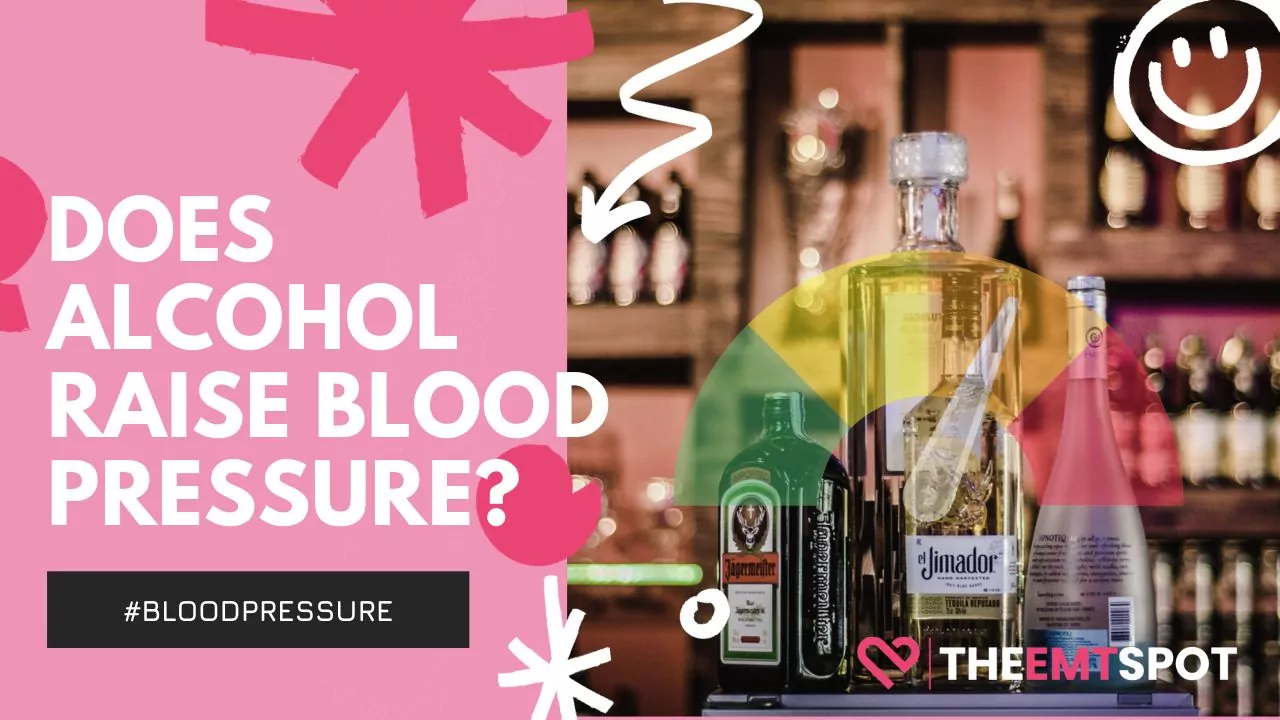
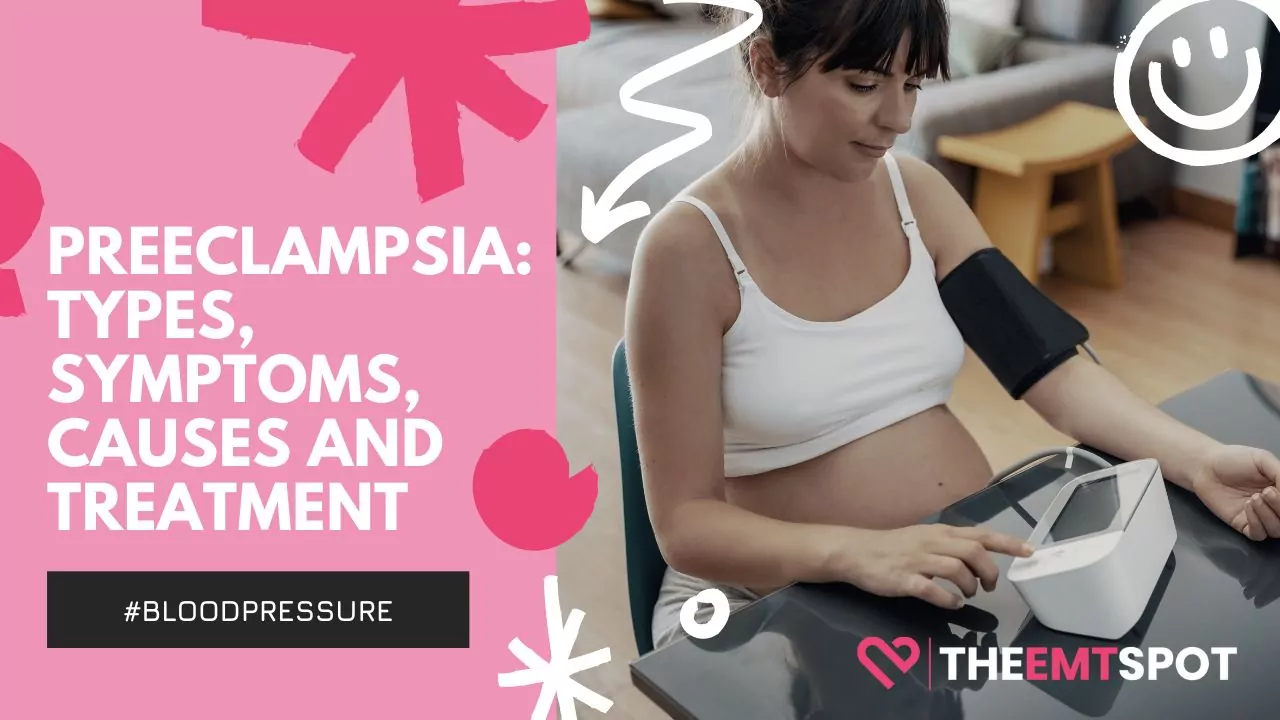
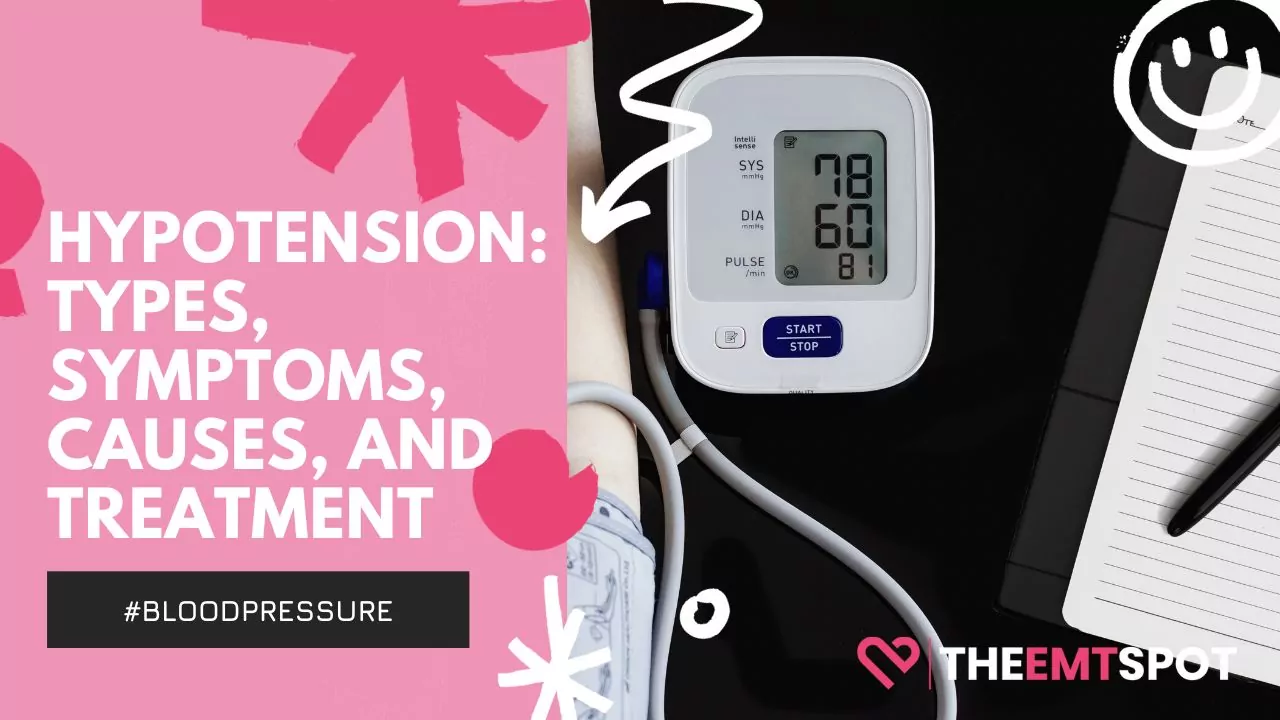
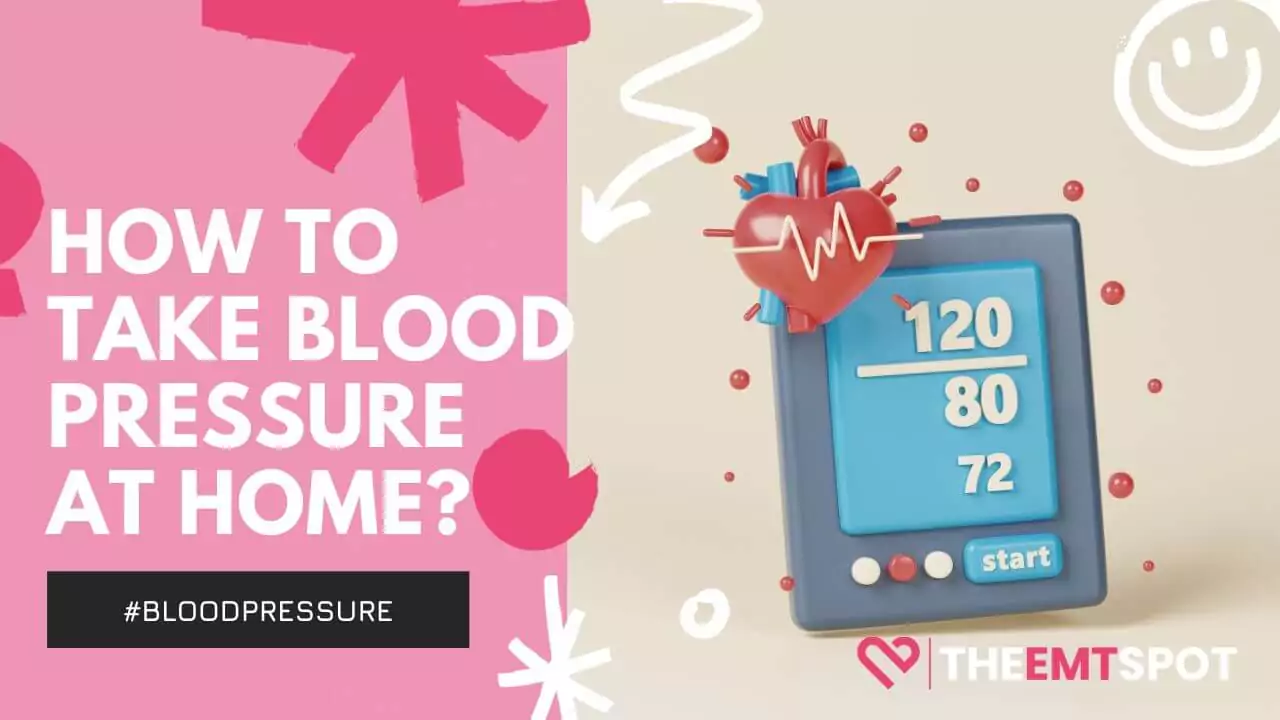
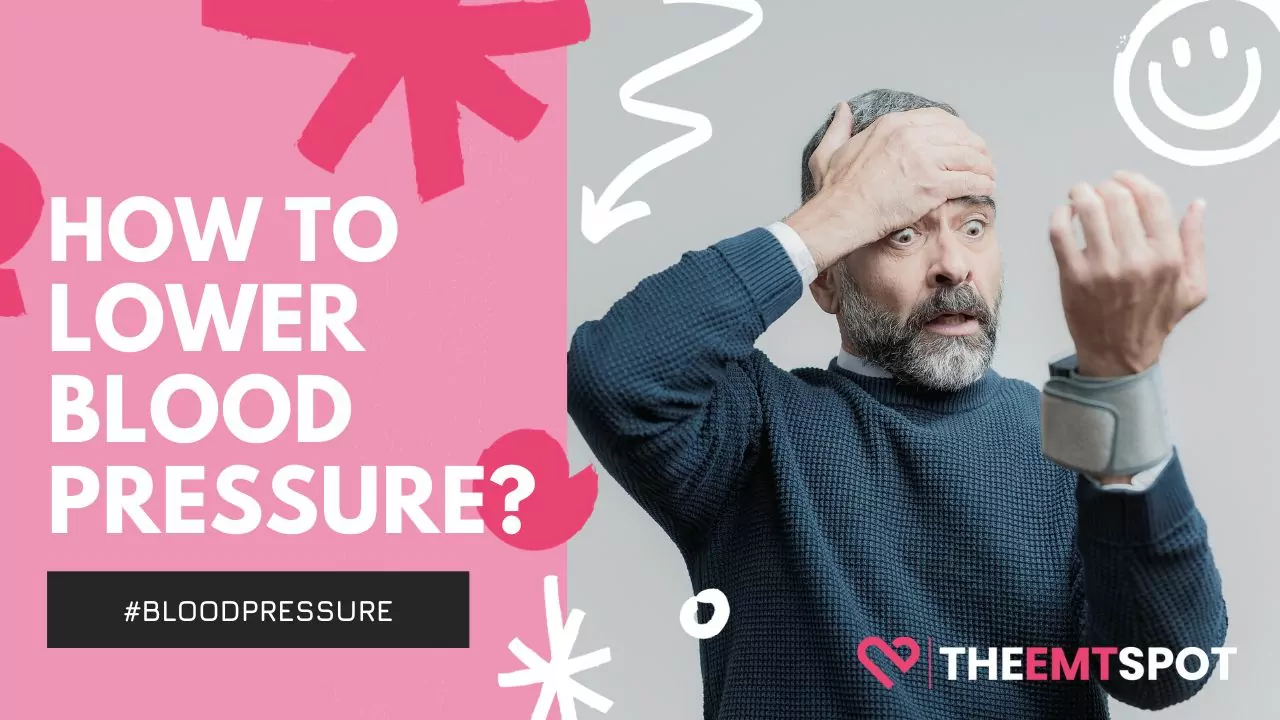
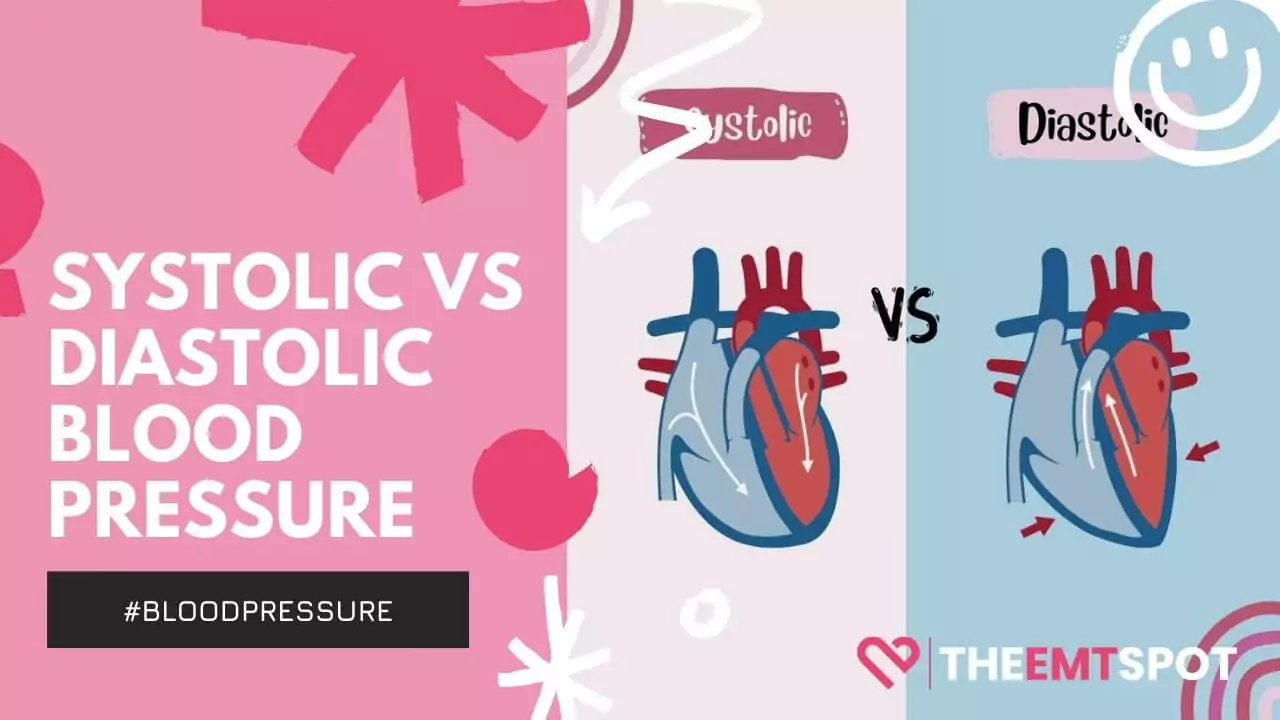
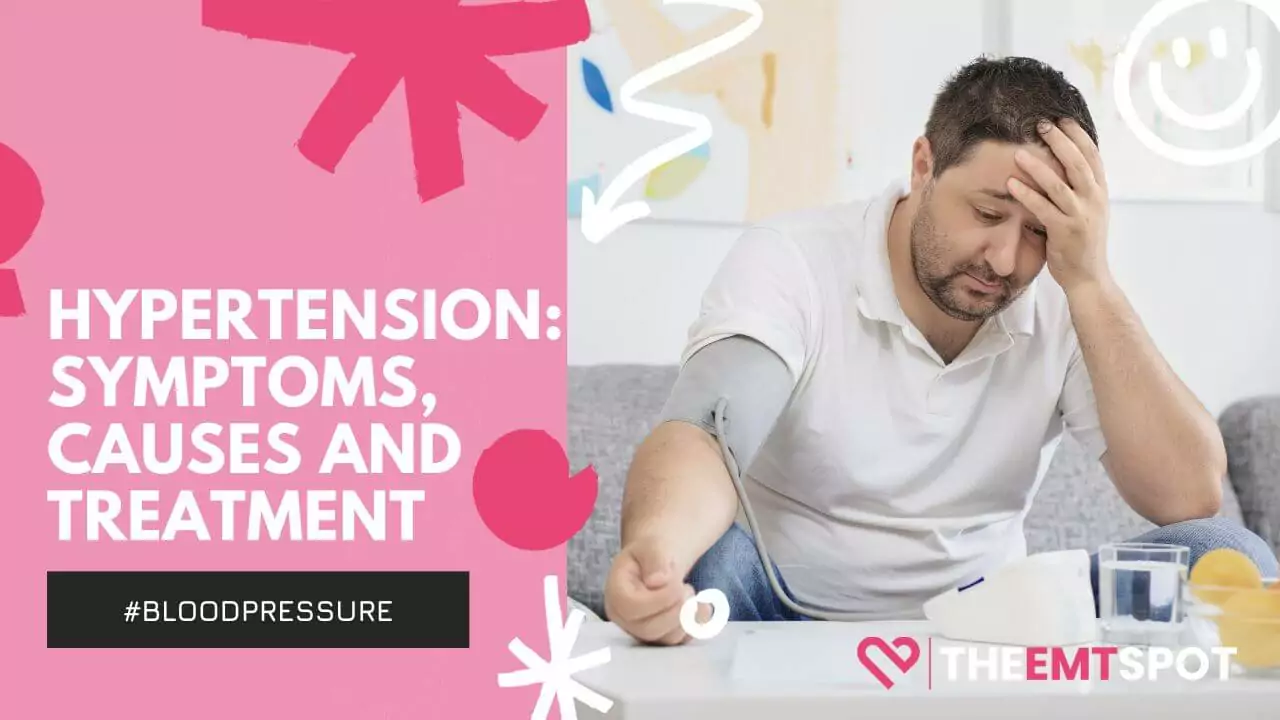
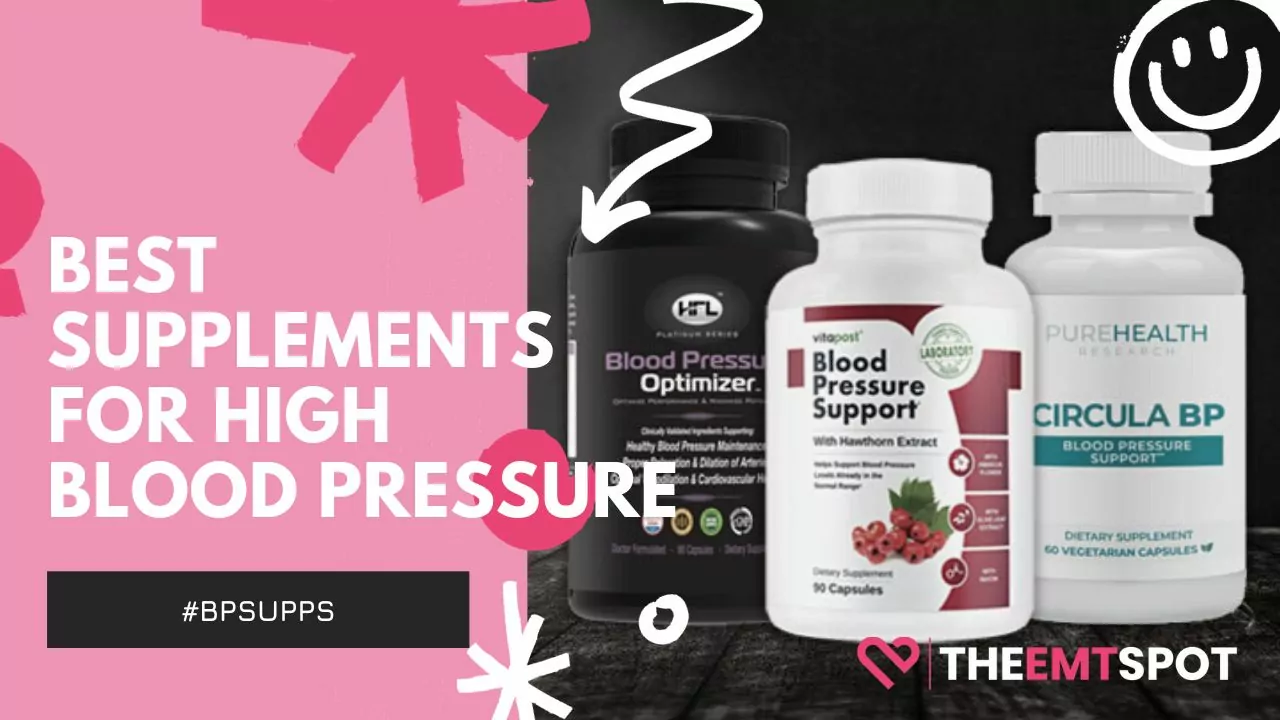
 Robin Backlund is a dedicated journalist and a medical student who has written several articles and essays exposing the falseness and hollowness of online resources in the medical science niche.
Robin Backlund is a dedicated journalist and a medical student who has written several articles and essays exposing the falseness and hollowness of online resources in the medical science niche.